
Dr Jane Townson, chief executive of the Homecare Association, assesses how the health and care system can meet growing demand from an ageing population



Dr Jane Townson, chief executive of the Homecare Association, assesses how the health and care system can meet growing demand from an ageing population




HC-One invests in serving the mainstream

Hartford Care launches new column
8 COVER STORY
Dr Jane Townson, chief executive of the Homecare Association, assesses how the health and care system can meet growing demand from an ageing population

Riverstone helps residents live the life they want to live
Chief executive officer
Alex Dampier
Chief operating officer
Sarah Hyman
Chief marketing officer
Julia Payne
Editor-in-chief Lee Peart
Features editor
Charlotte Goddard
Subeditor Charles Wheeldon
Advertising & event sales director
Caroline Bowern 0797 4643292 caroline.bowern@nexusgroup.co.uk
Business development director
Mike Griffin
Sales manager
Luke Crist
Business development executive
Kirsty Parks
Business development researcher
Robert Drummond
Delegate relationship manager
Sharifa Marshall
Event manager
Conor Diggin
Marketing content manager
Sophie Davies
Marketing campaign manager
Sean Sutton
Publisher
Harry Hyman
Investor Publishing Ltd, 5th Floor, Greener House, 66-68 Haymarket, London, SW1Y 4RF
Tel: 020 7104 2000
Website: caring-times.co.uk
Last month’s announcement of a Care Workforce Pathway and a new care certificate qualification came as welcome news for the sector and provided grounds for hope that the adult social care workforce is finally beginning to receive some of the recognition it deserves.
The moves by the government, which also include more funding for learning and development, apprenticeships and a new digital leadership qualification, will go some way to professionalising the workforce and making care a more attractive career pathway.
With around 152,000 vacancies, representing just under 10% of the workforce, a high turnover rate of 28% and recent government announcements likely to make access to overseas workers increasingly difficult, urgent action is clearly needed to stabilise the sector both now and for the future where it is estimated that around 440,000 more people will be required to meet rising demand from an ageing population over the next 10 years.
Conspicuously absent from the government’s announcement, however, was the issue of pay, which is surely a key fundamental in making care a desirable and sustainable career for more people.
In recent months, we’ve seen examples of local authorities increasing funding so that care providers are able to provide their workforce a real living wage. In many cases, however, especially in the most deprived parts of the country, local authorities simply don’t have the resources to bridge the gap.
In the end it must come down to central government to invest the required funding to ensure all carers are paid a fair wage to attract and retain more domestic workers. Linking salaries to equivalent NHS bands would provide an appropriate pay scale that recognises social care as the highly skilled profession it is.
Both Labour and the Liberal Democrats have made increasing care worker pay pledges in their general election campaigns. It’s imperative that whoever forms the next government honours that commitment.
Lee Peart, Editor-in-chief Caring Times
We hear from Care UK operations director Karen Seabrook and run through the latest
24
Time for another look at the CQC ratings system?
The latest big people moves in social care
27

Hartford
We get a taste of luxury retirement living the Riverstone way
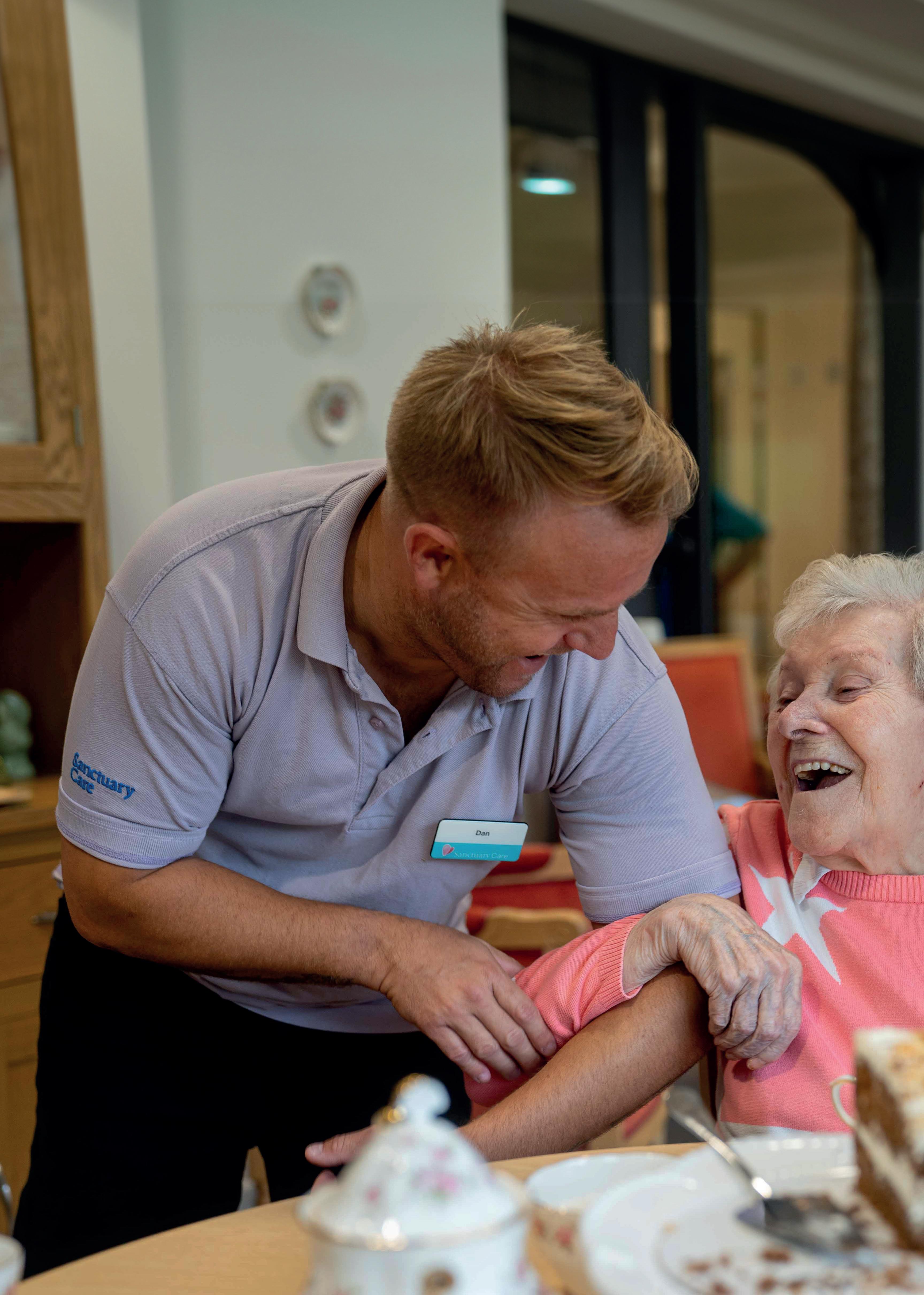
of life will diminish living in a care home reality
Sanctuary Care’s homes can be fun, enriching and a lifeline to many


Watch what life is really like in our homes in our new documentary series which tells the stories of real people living our homes.
find out more sanctuary-care.co.uk/docuseries
find out more sanctuary-care.co.uk/docuseries
Overseas workers who apply for their health and social care visa prior to new immigration rules coming into effect will still be able to bring in dependants, the government announced. The Home Office said care workers and senior care workers already in the UK will be able to remain with their dependants when extending contracts and changing their care employer and applying for settlement. Health and social care secretary Victoria Atkins earlier caused uproar after asserting that providers were “broadly relaxed” about health & social care visa changes.
Care England warned many services would be forced to close after a 6.5% rise in council funding for 2024/25 was announced. The stark warning came in response to the provisional Local Government Finance Settlement.
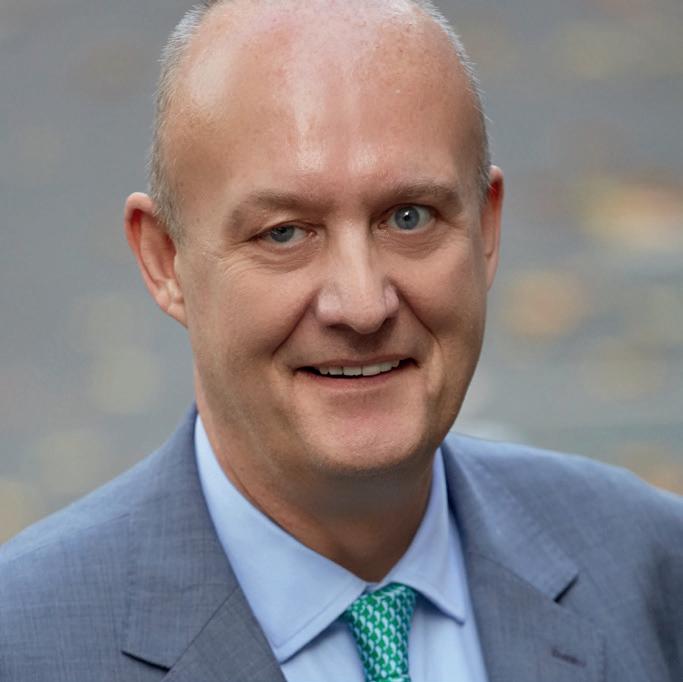
The Homecare Association published its minimum price for home care for the next financial year
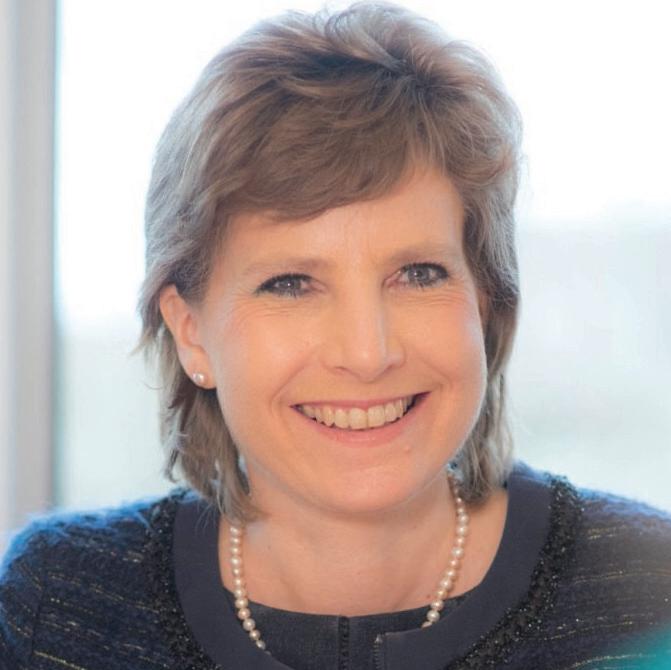
(April 2024 to March 2025). The minimum hourly fee rate for local authorities and the NHS of £28.53 allows for compliance with the new National Living Wage from April this year (£11.44) and the delivery of sustainable, good-quality, regulated home care services.
Care Forum Wales (CFW) accused Denbighshire County Council of budgeting for “rock bottom” fees for care homes that will be wiped out by inflation and the cost-of-living crisis. The not-for-profit body said the council was budgeting for care home fee rises of around 8% in 2024/2025, much less than increases of up to 20% planned by neighbouring Conwy Council.

Hallmark Care Homes rebranded itself in a bid to appeal to new audiences and stand out from the competition. The rebrand, which was developed with creative agency The Corner, was spearheaded with
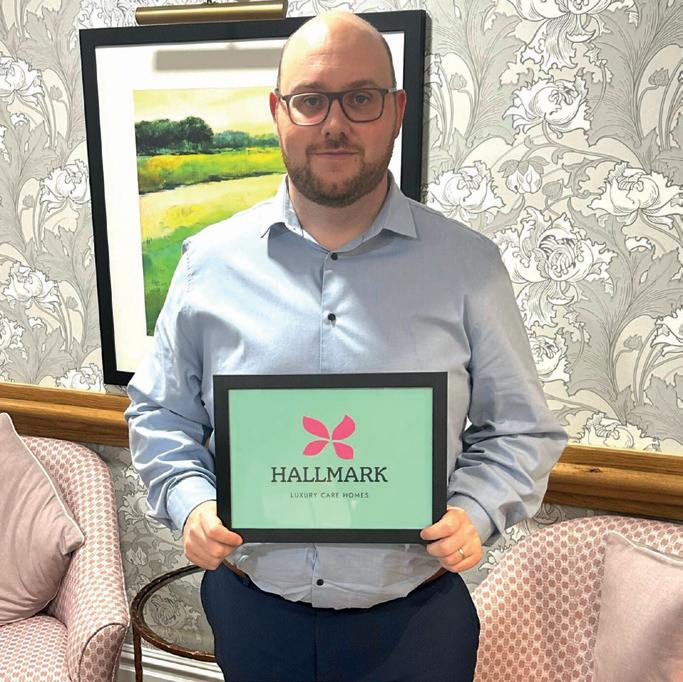
the launch of a new consumer-facing website. The luxury care home operator also announced it was refinancing the business “to enable future growth and investment” and reshuffling its leadership team with owners Ram and Vidya Goyal retiring and founder Avnish Goyal remaining as chair and continuing to lead the organisation, supported by managing director Nye Brown.
Residents dealt in illicit drugs and stored weapons in their rooms at a Dumbarton care home rated Weak by the Care Inspectorate. The shocking revelations came in a November inspection of Meallmore’s Alderwood House which provides care to adults enduring or recovering from a mental health disorder.
Care UK warned scammers were making “unsolicited and fraudulent” job offers to overseas workers in its name. A Sky News investigation revealed overseas workers were being asked to hand over thousands of pounds to apply for roles with the company under the scam.

Joanne Balmer, chief executive at Oakland Care, was named ESG Champion at HealthInvestor’s Power Fifty Awards for the second year in a row. The annual event brought together leading individuals from across the health and social care sector to celebrate inspiring successes.
A Northeast care home had its rating suspended by the Care Quality Commission following a BBC
Panorama investigation. The action was taken against Prestwick Care’s Addison Court, part of the Malhotra Group, following a number of safeguarding reports, including those from the BBC.
Advinia Health Care apologised after the Local Government and Social Care Ombudsman found it had breached Competition and Markets Authority guidance by giving six weeks’ notice of a 46% fee hike. The care home operator apologised for the lack of clarity about the resident’s Funded Nursing Care (FNC) award and the short notice of the large increase in fees which forced the resident to move from the home.
Family-owned care group CHD Living launched a complex care service to address the needs of people requiring specialised support. The new service is an addition to CHD Living's portfolio of home care, care homes and rehabilitation centres.
Berkley Care Group was named a ‘Top Employer’ by the Top Employers Institute. The luxury care group was awarded the prestigious Top Employers Certification for the first time in 2024’s Top Employers UK list, which analyses human resource practices and employee conditions.
Two people were charged following the assault of a 91-year-old man in a care home in Portree, Skye run by NHS Highland. Police Scotland said a 60-year-old man and 53-yearold man had been arrested and

charged following the incident on 14 September 2023.
Learning disabilities care provider, Home From Home Care, marked its 20th anniversary by offering a 4% pay rise for its 500 employees. The inflationary pay rise, which was brought forward from April, means all workers earn at least the real living wage of £12 an hour.
GMB members voted for strike action at HC-One’s Victoria Park care home in Coventry last month. A statement by the union said members had voted to support strike action on 24 January.
Employee-owned care home operator Shaw healthcare reported a drop in profit due to higher costs in 2023. The care home operator posted normalised profit before tax of £5.9 million in 2023 down from £10.6 million in 2022.

A Northeast NHS trust is scaling up a programme using drones to deliver medical supplies to hospitals, GPs and care homes. Northumbria Healthcare NHS Foundation Trust will roll out the programme this autumn with healthcare logistics company Apian and drone delivery business Zipline.

Person Centred Software acquired DepenSys, an app which matches care staff capability and capacity with care residents’ needs. Person Centred Software’s Connected Care platform includes care planning, wellness and activities, medication management and care home operations.
MHA launched its own lifestyle and wellbeing app with the aim of keeping the minds and bodies of older people active. Through MHA Active individuals can access a growing library of more than 600 videos, articles, games and quizzes. The app’s dementiafriendly section offers activities such as yoga, tai-chi and arts and crafts.
Dr Jane Townson, chief executive of the Homecare Association, assesses how the health and care system can meet growing demand from an ageing population
When my great-grandmother was born in 1879, there were only 60,000 people aged over 85. In 25 years’ time, there will be 3.5 million people aged over 85, with one in four over 65.
The health and care system cannot meet demand now, so how will we manage in future?
Our options are to increase supply of care, reduce demand for care, or both.
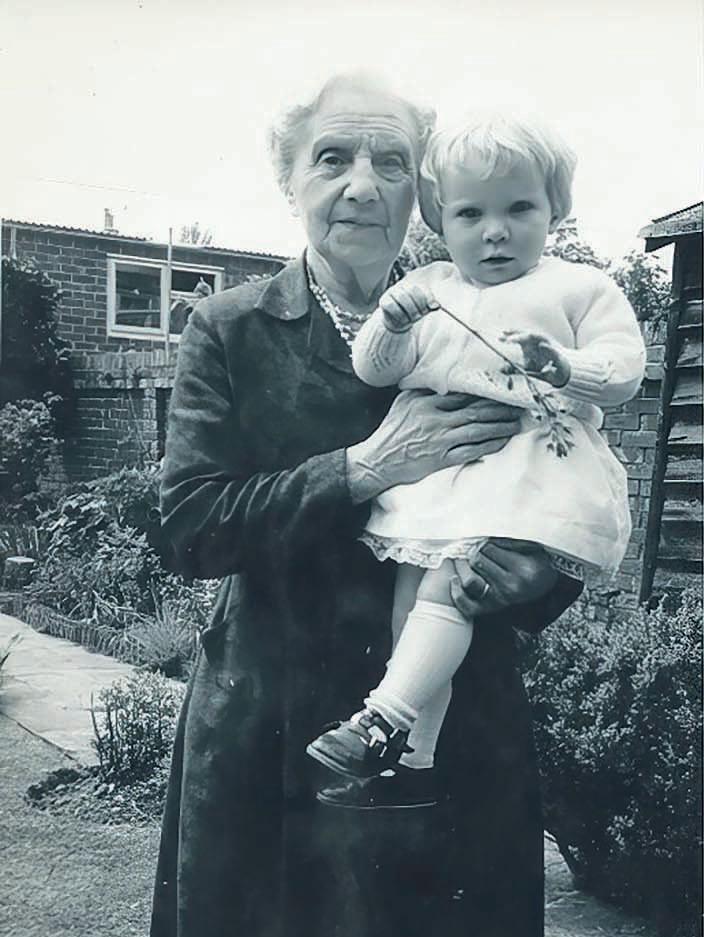
1. Increase supply of care Skills for Care analyses requirements for care workers by comparing the number of posts in adult social care in each local authority area in England with the corresponding number of people aged 65-plus in the population. In 2022/23, on average, for every six people aged 65-plus, one adult social care post was required. Assuming nothing changes, 440,000 new posts, will be needed by 2035. There are currently 152,000 vacancies, and the UK-based workforce has been steadily shrinking since 2020/21, so how likely is it we can turn the situation around?
Many have written extensively about ways to improve recruitment and retention of care workers. Neil Eastwood’s book on the subject, Saving Social Care, is full of evidence and
practical tips. The best employers are implementing the advice but continue to struggle. Reasons for this include competition from other sectors, which can offer greater security of income, higher pay, and better terms and conditions of employment. The inherent variability in demand for home care makes it hard to offer full-time contracts in an economically viable way, particularly when public sector fee rates are too low to cover costs.
Care providers have turned to international recruitment to plug gaps. While this works well for some, there are concerns about ethics, practicalities and financial viability. Most countries will need more care workers in future and labour shortages are a global phenomenon. Overseas labour is thus not a sustainable solution.
As a society, we must invest far more in care services and in developing our UK workforce if we are to receive help when older or disabled.
In October last year, Skills for Care announced plans to develop a new and comprehensive workforce strategy for adult social care, which is long overdue.
If citizens and the government in the UK are, however, unwilling or unable to spend more on care, insufficient numbers of British citizens wish to perform care roles, and immigration is not practical or politically acceptable, we will have to reduce the need for care by improving the population’s health.
2. Reduce demand for care
Multiple factors influence human health, so a silver bullet is unlikely. Where could we focus attention?
The UK’s spend on healthcare is around 11% of GDP, which is comparable to peer countries in the OECD. Relative to peers, though, the UK’s spending on acute hospital care is among the highest and on community-based and preventative care among the lowest. We also spend less and have fewer beds and physicians per capita
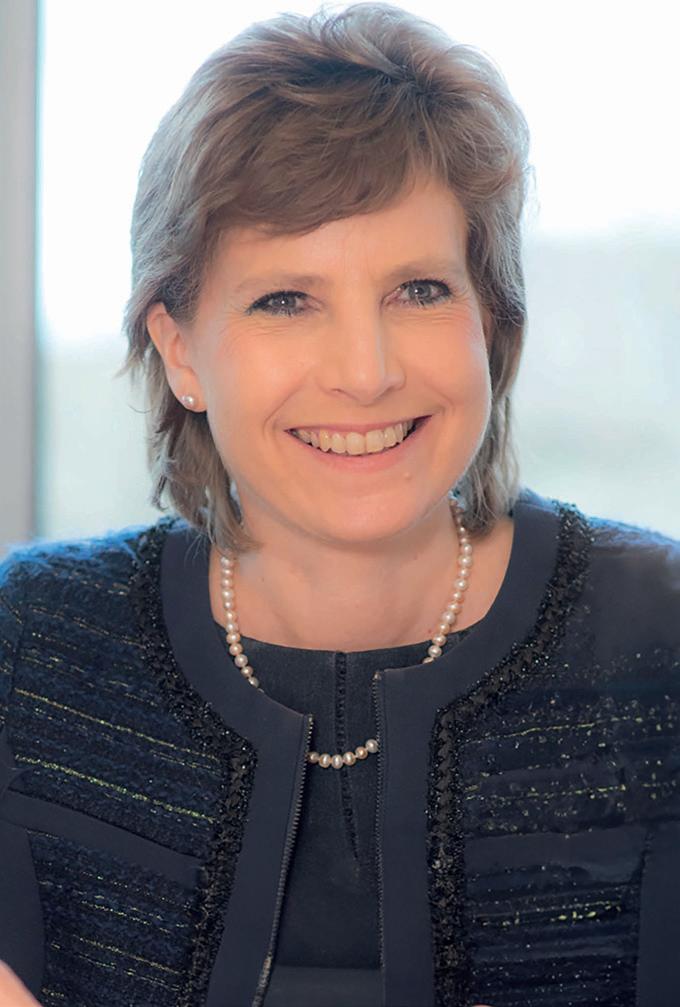
than the European average. Evidence shows that social factors such as relationships and community connections, poverty, education, housing, diet and physical activity have a far greater impact on health outcomes than healthcare per se.
We need to shift from crisis management of hospitals to supporting people to live well at home and in their communities. Comprehensive analysis of options is beyond the scope of this brief article, but we could:
• Prioritise preventative care and early intervention to promote healthy ageing.
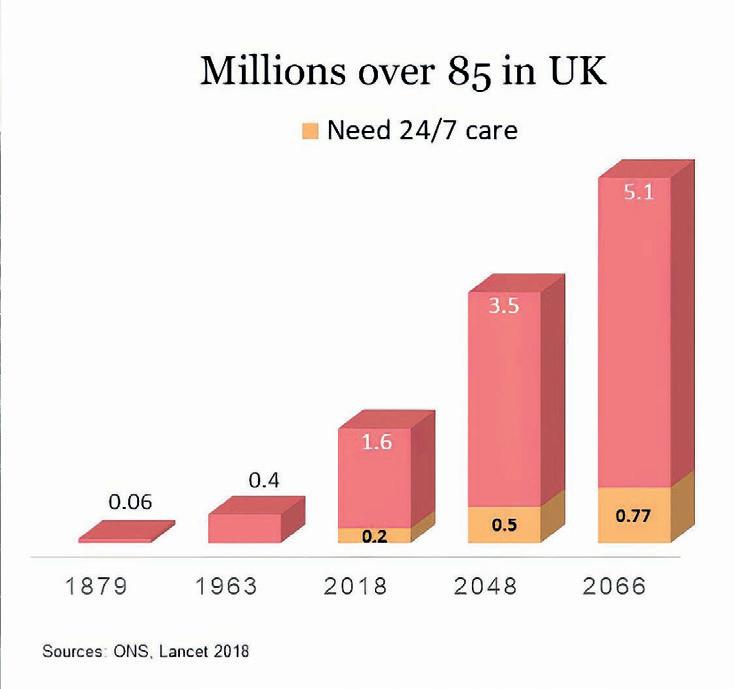
• Promote healthy lifestyles, social connections including intergenerational interactions, volunteering and meaningful activities to support physical and mental wellbeing.
• Provide family carers with financial relief, workplace flexibility, respite care and training.
• Build more age-friendly homes and communities with accessible features.
• Improve mobile phone and IT infrastructure so more people have access to fast Wi-Fi and mobile networks.
• Improve transportation options for older adults, ensuring mobility and connectivity.
• Support financial security by encouraging longer working lives and pension reforms to ensure adequate retirement income, as well as phased retirement and flexible working arrangements.
• Retrain and upskill older workers to enhance their employability.
• Promote positive attitudes towards ageing and tackle age-based discrimination.
Alongside social policy change, advances in science and technology could support healthy longevity.
Medical advances, such as drugs to prevent or treat dementia may emerge. There are around 900,000 people with dementia in the UK. This could rise to 1.6 million by 2040. Reducing this number could substantially reduce the need for care.
Assistive technologies, including Internet of Things (IoT), Ambient/ Active Assisted Living (AAL) robots, and other artificial intelligence tools, can support independent living. Robots to help us in and out of bed independently, for example, could be life changing. Redesigning ordinary products to make daily activities, such as opening cans easier, could also be transformational. End users must be involved in the design process to avoid mismatches between technologies and needs.
Robotics could also help to address labour shortages in the wider economy caused by an ageing population. China is investing heavily in automation to reduce reliance on people. Indirectly, automation could assist the availability of labour for the care sector.
Older adults are using telehealth, smartphone apps, and wearable devices to reduce barriers to care, maintain patient-provider communication, and promote disease self-management. These technologies can shift traditional medical routines to remote medicine, transforming our ability to manage health and wellness. Technology solutions can also enrich lives by connecting people and reducing loneliness. Most of us need face-to-face contact with others for wellbeing, so technology has limitations. Some older people struggle to use telehealth independently, which will change in future generations.
For the first time in history, projections show older adults will outnumber children. Without urgent action, our society faces dire consequences. We have a moral obligation to act now.
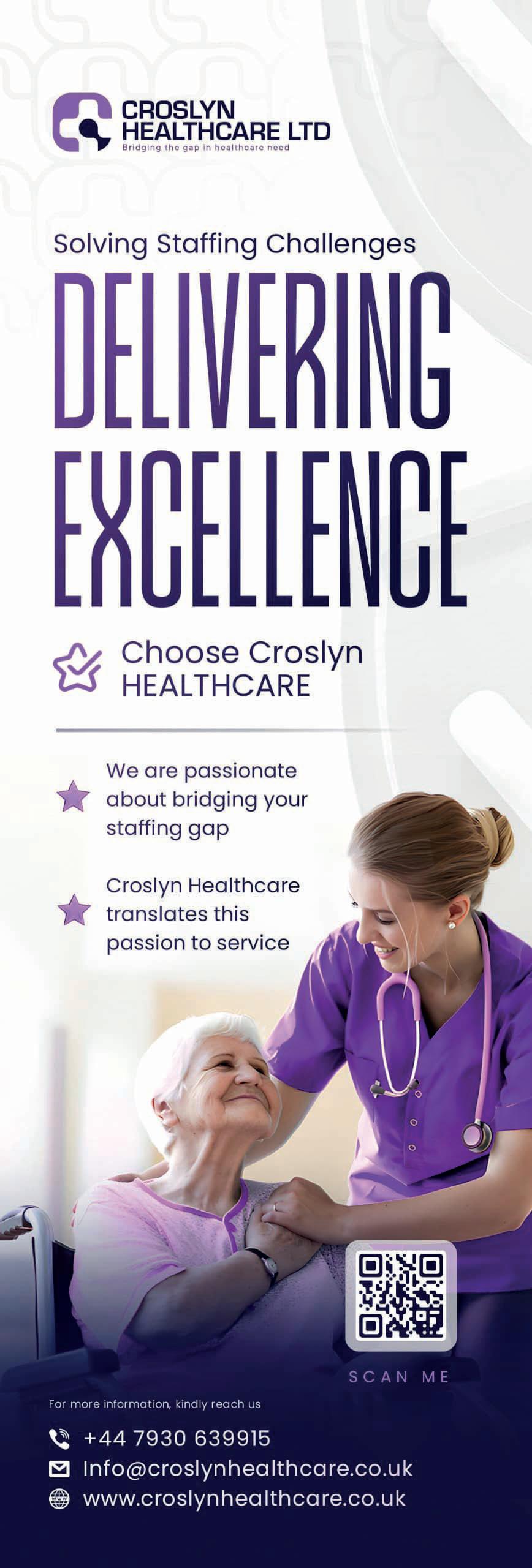
HC-One’s refinancing in March 2021 saw the consolidation of its £570 million debt. With US-based health and property investor Welltower and private equity owner Safanad taking majority control, the business was put on a sounder, long-term financial footing.
At the same time, HC-One launched a major investment programme in its homes, which included a refurbishment programme of more than 200 of its homes, The company also decided that it was not the best owner and operator of 52 of its then 328 care homes.
“We made the decision we couldn’t be all things to all people and there would be certain geographies where we wouldn’t have scale, or the local authority fee rates weren’t sustainable, or the building was sadly no longer fit for purpose,” Tugendhat says.
“The really important thing for us is that our homes should be able to meet the dementia needs that our communities have, and should be located in areas where colleagues can get to work and afford to live, and are in geographies where local authorities are committed to sustainable funding over time. That’s where our portfolio is today and we see the opportunity to bring more homes of high quality with
“One of the things that I am most proud of is that over the last three years we have moved from being largely a National Living Wage employer to a largely Real Living Wage employer.”
committed workforces into our family.”
The refurbishment programme is seeing HC-One invest almost £100 million in its environments, which Tugendhat described as the “single biggest ever investment in local authority funded care environments”.
More than 100 care homes have been refurbished under the programme with a further 30 to follow this year.
The upgrading of the company’s largely purpose-built portfolio was further consolidated with the acquisition of 37 services from Ideal Carehomes in October last year.
“Ideal represented a really great fit for us because of their expertise gained with being owned by developer LNT,” Tugendhat says. “Ideal have a long history of knowing where to locate homes with a very similar view to us about where you can best site homes so that colleagues can afford to live nearby and you can meet the right need in the community.
“The acquisition was really a way of teaming up with another group that would accelerate our new build programme, both by bringing in homes that are still in the opening stage and by building our expertise in where to site homes and how to develop them.
“On top of that Ideal are very much about serving the mainstream and as we look to renew the overall portfolio it gave us an opportunity to bring in some newer homes in geographies that are contiguous with our existing geographies. Our homes are all nearby but not overlapping so we could really play to our strength and expand our footprint.”
As HC-One continues to invest in its environments, Tugendhat says further acquisitions are likely this year but adds these would not include any of the Four Seasons homes currently on the market.
“We would want homes that are in the right places for us and the right age,” Tugendhat says. “I know that many of the Four Seasons homes are good homes, but they wouldn’t be our focus.”

As equally important as investing in its environments, HC-One is investing in its workforce in order to provide quality, long-term care. The care home operator has raised wages by around 10% each year over the past two years and plans to do so again this year.
“We spent £32 million last year alone on increasing salaries,” Tugendhat notes. “One of the things that I am most proud of is that over the last three years we have moved from being largely a National Living Wage employer to a largely Real Living Wage employer.”
Over 80% of the company’s 20,000 staff are now on the Real Living Wage, however this has not prevented friction with its unionised workforce, members of the GMB, over pay and working conditions in recent months.
A recent GMB survey found four in ten HC-One members had considered leaving due to pay levels, while members at its Victoria Park care home in Coventry voted to strike last month over working conditions and the sacking of their care home manager.
While acknowledging the union survey highlighted “some real issues and some really difficult individual cases”, Tugendhat argues it was “not representative” of the HC-One

turnover last year as evidence of growing staff satisfaction levels.
“Our internal colleague survey shows people feel really proud of where they work, but we can only keep doing more.”
workforce as a whole, with around 3,000 to 4,000, or only one in five of the company’s workers unionised.
The HC-One boss points to the company’s 50% improvement in staff
“I don’t think you get a 50% improvement in turnover if a workforce is feeling worse, not better,” he argues. “I don’t think you’re able to recruit well ahead of the sector if people feared you are a worse place to work. Our internal colleague survey shows people feel really proud of where they work, but we can only keep doing more. We pay above the sector with a much higher rate of local authority than most and therefore we have lower income, but have still invested ahead in higher wages.”
Around 70% of beds are taken up by local authority fee payers.
Vacancy rates and staff turnover rates are both far below the average for the
sector, Tugendhat highlights. He says HC-One’s aspiration is to have all workers earning at least the Real Living Wage and called on local authorities to continue to partner with the business on achieving that aim.
“We have Scotland, Wales and a dozen or more local authorities in the UK supporting us to pay the Real Living Wage to all colleagues in care,” Tugendhat notes.
With many local authorities in financial distress, however, he acknowledges there are many examples of “very poor” fee increases and spot prices well below the cost of care. With these local authorities concentrated in the most deprived areas of the country, Tugendhat echoed concerns raised in >
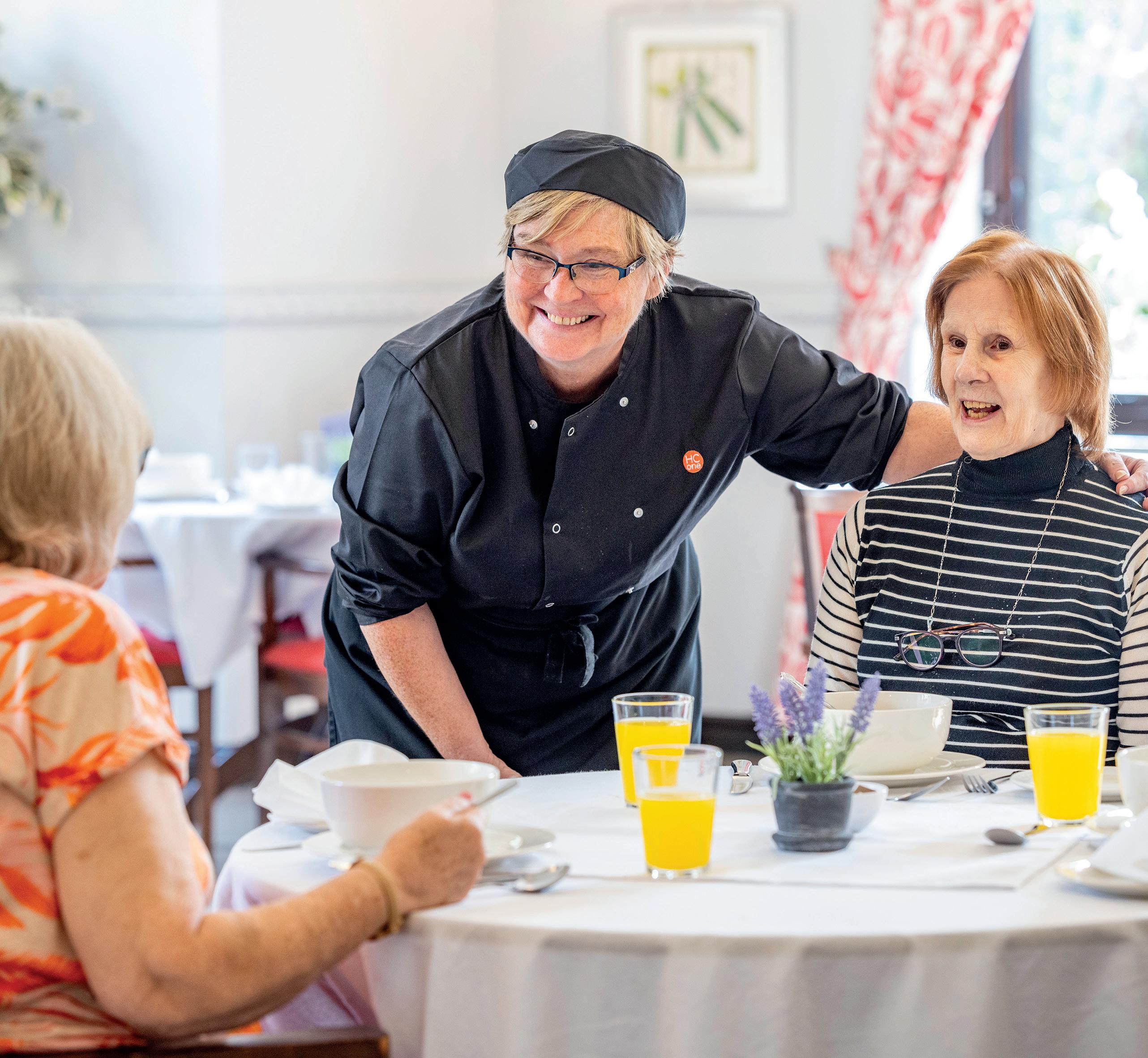
“I think we need both a national fair cost of care and a fee rate set at local authority level.”
the Care Quality Commission’s ‘State of Care’ report in October of an emerging two-tier care system as care providers exit from local authority provision in areas that need it most.
“We can’t compete in those geographies and my fear is that we will
just see more and more local authority care leave and you will end up with the least supply in those places that need the most local authority funded care homes – and you will get into a terrible spiral,” he warns.
The care home leader stresses the adoption of a fair cost of care as the only means of averting a looming national crisis.
When asked by Caring Times whether he believes in a national rate for the cost of care as is the case in Scotland for example, Tugendhat comments: “I think we need both a national fair cost of care and a fee rate set at local authority level.”
The HC-One chief executive says government needs to strike the “right balance between funding formulas and
recognising that every local authority has different circumstances and different community needs”.
He adds: “I would like to see a mixture of national formulas and criteria while recognising that the commissioning expertise is still with local authorities and the NHS on the ground and that each community is different, and that no local authority should be below what their numbers show is a fair cost of care, which is a position not where providers are making more money but one that sustains pay and will encourage more investment not less.
“There’s a real opportunity, whichever government is in power, to have a nationally organised sector that encourages the right investment to


deliver quality through the workforce with a locally delivered sector where we understand local nuances and needs.”
Tugendhat welcomes work done by the Labour Party and The Fabian Sector on a national care service, as well some recent thinking on reform by the Department of Health and Social Care and the Conservative government.
With Labour still riding high in the opinion polls and a general election expected later this year, Tugendhat says
he is “excited about what Labour can offer”, while welcoming that all political parties are thinking about how they can better organise the care system.
While acknowledging Labour’s policy announcements on national pay bargaining for the care sector and investing in quality through the workforce, Tugendhat says the opposition’s comments on private equity ownership of care providers were “prone to being misinterpreted”.
He adds: “If you look at the work shadow care minister Andrew Gwynne
and shadow health secretary Wes Streeting have done on the national care service and the Fabian report, what they have talked about is the importance of better organising the sector and of making the current model of care delivery work better for the taxpayer and those receiving care, and the duty of owners to be responsible, and to be full UK taxpayers which is what we are.
“Wherever our ultimate international owners may sit, all our entities are subject to full UK tax. I agree we should be responsible owners. I don’t think they are targeting a given ownership model, but what they are targeting is responsible ownership and behaviour.”
A crucial national role
Tugendhat says HC-One remains “100% committed” to continuing to play its crucial national role in being by far the largest care home provider of local authority funded care.
“It’s a real privilege to create homes in which our teams can deliver the care that people want and that their condition and circumstances require,” he concludes.
“So many colleagues love the job they do because of the difference they can make and our job as a provider is to keep making that ever more possible and I hope that government keeps working with us to create an environment where we can keep doing that.”
Townsend Communications’ managing director, William Walter, interviews Efua Poku-Amanfo, research fellow at the Institute for Public Policy Research, regarding the rise in section 114 notices, the outlook for local authority funding and the implications for adult social care funding
Why are we seeing an increase in the number of local authorities issuing section 114 notices?
An estimated 75,000 local authorityowned assets valued at £15 billion have been sold in the past 13 years in a desperate bid to plug funding gaps. What's more, our current funding formula is outdated and is no longer suitable for the needs of modern Britain. We’ve also seen pots of funding by the government given to local authorities based on competitive bidding, rather than need. Consequently, local authorities have had to sell off integral assets to keep their head above water and haven’t had the investment to create a cyclically strong local economy.
Do you expect to see an increase in the number of section 114 notices over the coming year?
Which local authorities do you believe are most at risk over the coming 12 months?
Research by the Institute for Public Policy Research indicates this trend of asset selling to plug short-term funding gaps will continue with a further 2,500 buildings and other assets at risk of sell off. It’s clear the authorities most at risk will be in the poorest part of the country, for example, towns and cities in the North and local authorities with high levels of housing needs such as coastal towns like Hastings. While some local authorities are clearly more at risk than others, the current funding
formula is risky business for all due to how incompatible it is with the changing needs of the nation.
What are the implications for the provision of adult social care services in these areas?
The needs of the nation are changing rapidly; we are becoming sicker and poorer as a nation with a growing gap in healthy life expectancy between the most and least deprived parts of the country. Local authorities face a new set of challenges but are unable to respond properly due to a chronic deficit of assets and funding. Statutory duties within social care are compromised and local authorities are forced to provide a fragmented service. This alongside a low-paid unstable workforce leaves individuals to find the funding themselves, depend on family, or simply accept the bare minimum of care.
Should evidence of financial mismanagement at a local level mean the ceding of spending control to local authorities in key areas should be reversed?
Local authorities should be trusted to take ownership of fiscal responsibility. We can't shape governance with highstakes accountability, but we can change our funding formulas to be fairer and ensure we have an effective, clear accountability system that intervenes when appropriate. What we know is that local leaders and places are ready to get

stuck into implementing new placebased policies to reach the full potential for the people living in their locality, but they can only do this if they have the resources, the autonomy and the capacity to grow their headcount and expand their work.
“While some local authorities are clearly more at risk than others, the current funding formula is risky business for all due to how incompatible it is with the changing needs of the nation.”

David Fothergill, deputy chairman of the Local Government Association, sets out his thoughts to William Walter, managing director of social care PR consultancy, Townsend Communications, regarding the outlook for local authority funding of adult social care in 2024 given the rise of section 114 notices being given
Councils enter a precarious year financially, with an inevitable knock-on effect on adult social care services.
As we enter the new year, councils are particularly concerned about the impact of the increase in the National Living Wage (NLW) to adult social care budgets, and what it could mean for people who draw on care and support if services do not receive additional financial support.
With no additional funding in the Autumn Statement or provisional Local Government Finance settlement to balance the increase in the NLW, 2024/25 will be an incredibly challenging year for adult social care and could well tip many councils over the edge.
A recent LGA survey found that one in five council leaders and chief executives in England surveyed think it is very or fairly likely that their chief finance officer will need to issue a section 114 notice this year or next.
The LGA estimates that councils in England face a £4 billion funding gap over the next two years just to keep services standing still but last month’s Autumn Statement failed to provide the additional funding needed to protect services from further reductions.
This is despite councils of all political colours and types warning growing demand and cost pressures are threatening their financial
"Councils enter a precarious year financially, with an inevitable knock-on effect on adult social care services."
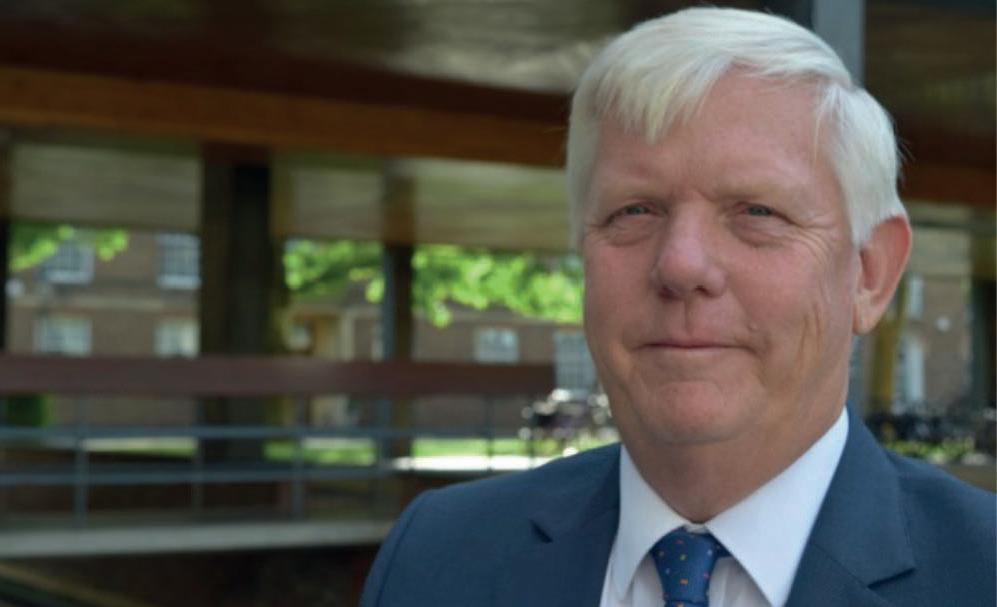
sustainability, with significant impacts on people.
In 2024/25, councils will be able to increase general council tax by 3% without the need for a referendum. Those with social care responsibilities will again be able to increase the adult social care precept by up to a further 2% again.
This means that councils continue to face the tough choice about whether to increase council tax bills to bring in desperately needed funding to provide services when they are acutely aware of the significant burden that could place on some households.
Councils are calling on the government to urgently work with people who draw on care, unpaid carers, councils, providers, the workforce and the voluntary sector to help secure additional funding for social care in the forthcoming Local Government Finance Settlement.
The ADASS Autumn Survey recently found councils are predicting that adult social care will overspend by £515 million this year despite the increase in budgets.
The adult social care workforce provides committed and compassionate
"The adult social care workforce provides committed and compassionate care and support around the clock. The sector contributes significantly to the economy and plays a key role in helping to release some of the pressures facing the NHS."
care and support around the clock. The sector contributes significantly to the economy and plays a key role in helping to release some of the pressures facing the NHS.
The increase in NLW uplift is rightly good news for care workers and we hope it will address some of the recruitment and retention challenges facing the adult social care workforce.
Financial and workforce pressures are forcing adult social care providers to turn down new admissions and close services, according to Hft and Care England
The ‘Sector Pulse Check 2023’ report, commissioned by learning disability charity Hft and Care England, finds that government grants are not reaching the people who need them most.
The report, based on a large-scale survey of adult social care providers, reveals that despite a £7.5 billion funding boost in the 2022 Autumn Statement, there’s been little progress in the key challenges facing the sector.
Energy cost increases ranging from an average 72% and up to 350% and unfunded rises in the National Living Wage left 40% of adult social care providers in deficit last year. Workforce costs were the most significant cost pressure for providers highlighted by 81% of them. Annual increases in the National Living Wage were the most significant workforce-related cost with 79% reporting that local authority fee increases did not cover the impact of this in 2023.
More than 84% of care providers said that recent government funding initiatives such as the Market Sustainability and Improvement Fund and International Recruitment Fund made no difference to the financial sustainability of their organisation over the past year.
The survey found reduced capacity among providers as:
• 43% closed services or handed back contracts.
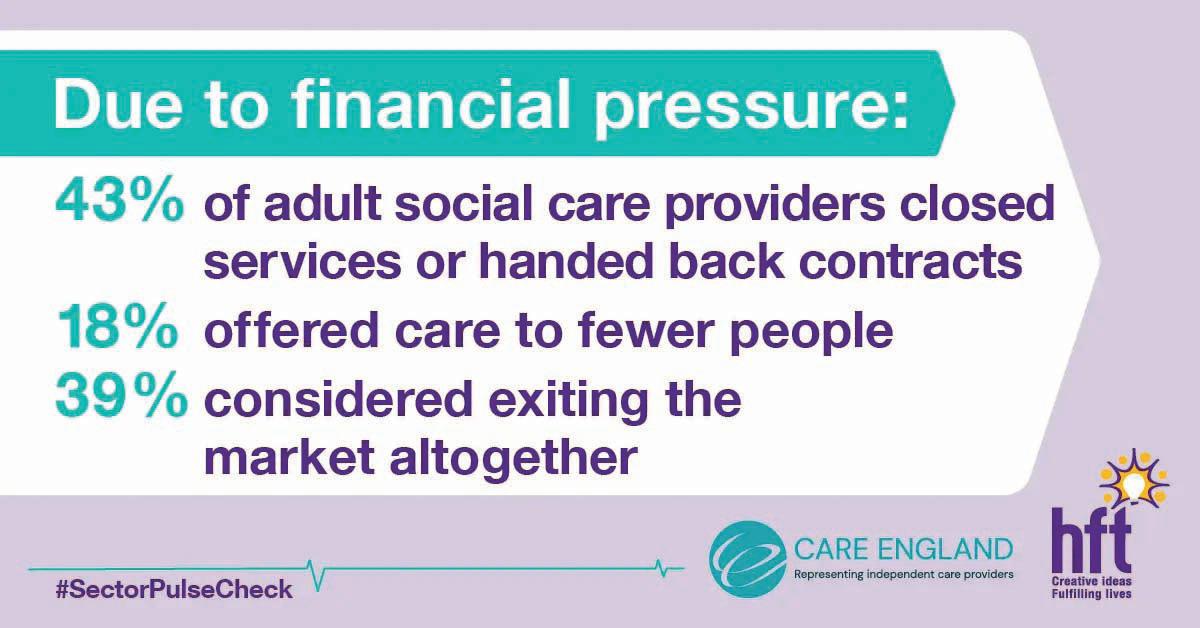
• 18% offered care to fewer people.
• 19% made staff redundancies.
• 39% considered exiting the market altogether.
• 44% had to turn down admissions due to a lack of staff.
Hft and Care England are calling on the government to implement immediate measures to support the care sector, including improving commissioning practice, revising VAT arrangements and removing barriers to ethical international recruitment.
The report makes the following recommendations:
• Reform VAT in order to alleviate cost pressures, including expanding the NHS 55% agency cap to adult social care.
• Establish national commissioning standards including the adoption of a fair cost of care.
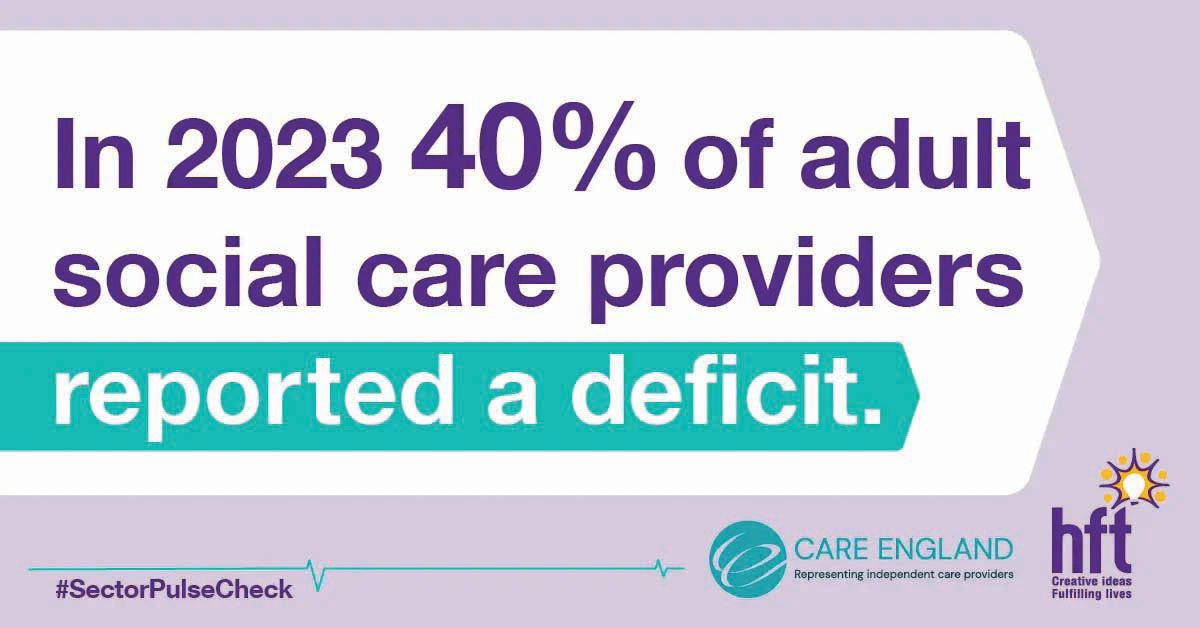
• Make international recruitment more accessible to more providers by decreasing visa fees, improving access to sponsorship for providers with a record of ethical recruitment. Offer greater support for providers to navigate the international recruitment process and establish a best practice guide to protect providers and employees.
• Introduce a statutory duty for adult social care providers to be represented on integrated care boards.
Professor Martin Green, chief executive of Care England, said the sector was on "red alert" despite the government's "narrative of ‘record investment’ into the sector."
“It’s clear that the way our system is funded needs a rethink," Green said. "For years, adult social care providers have absorbed increased costs and inflationary pressures without corresponding funding. When money is made available it simply isn’t cutting through. Recent changes to immigration rules and an insufficient Local Government Finance Settlement this year further suggest a government that is heading in the wrong direction."
Steve Veevers, chief executive of Hft, said the upcoming general election provided the new government with "a perfect opportunity to address what is a key challenge for today’s society but one which nobody seems to be taking seriously enough".
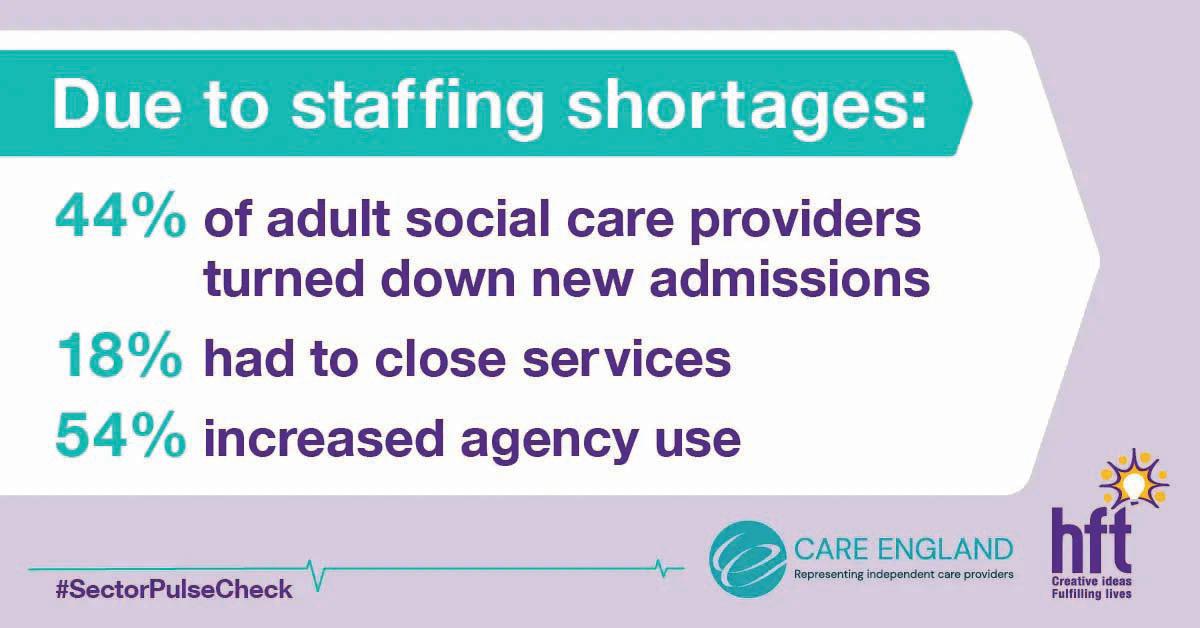
Veevers continued: "Our report provides several realistic, practical and impactful suggestions – including reforming VAT, revisiting the new visa laws for international workers and establishment of national commissioning standards – which we shouldn’t delay in implementing if we want to see real change from the next government."
“Our long-term vision remains one
of a sustainable sector that is financially viable and an attractive destination for staff. While this may seem a distant reality, there are a range of policies at the government’s disposal that would help turn the tide and put us on the path towards a sustainable future. As we count down to a general election, the government must now make good on their promise to fix our sector. The
recommendations outlined in this report represent pragmatic first steps and I urge the government to lose no time in implementing them.”
A Department of Health and Social Care spokesperson said: “To address the issues facing the care sector, we’re investing up to £8.1 billion to put the adult social care system on a stronger footing, enabling local authorities to buy more care packages, help people leave hospital on time, and reduce waiting times.
“We have made significant progress in delivering the People at the Heart of Care plan, our ambitious 10-year vision which will transform care in England.
“We also announced a major boost to the care workforce through the creation of a new accredited qualification meaning for the first time, there will be a national care career structure, giving the profession the recognition it deserves.”



Hartford Care’s quality director Nicky Barnes says improving the company’s green credentials is a key factor in its growth strategy
Hartford Care’s ethos is ‘Creating Caring Communities’; our philosophy of care is underpinned by creating communities that are friendly, kind and welcoming of everyone, caring for each other and celebrating individuality by recognising that everyone needs something different to thrive.
We are committed to building a sustainable future, continuously investing in our homes and improving our green credentials. Sustainability is key to our growth strategy, and we’ve already invested more than £8 million to help reduce our carbon footprint and futureproof our homes.
So far, we have installed solar panels at 11 homes, with a further five due to be completed this year. Where already installed, on average, around 30% of each home’s energy is now being produced from the solar panels. In addition, we are undertaking refurbishment projects and extensions across our homes.
Fundamentally, for Hartford Care, sustainability encompasses much more than just environmental concerns. Under the S ‘social pillar’ of ESG, which includes workplace health and safety, fair pay and living wages, equal employment opportunities, employee benefits and community engagement, we continually put ourselves at the forefront of innovation. We launched
“We are committed to building a sustainable future, continuously investing in our homes and improving our green credentials.”
virtual reality headsets for residents with dementia across our homes in March last year, along with trialling pioneering room sensor technology aimed at minimising the risk of falls and improving sleep. Most recently, we installed a digital thermostat control for each bedroom which automatically changes the temperature if it’s too hot or cold, along with alerting staff if windows are opened.
Our team is at the heart of the business and staff are carefully recruited so residents are supported as if they were a member of their own family. Dedicated to setting the best example in the care sector, in December 2022 we introduced a winter fuel contribution of up to £600 for all our staff. We also host an annual awards ceremony to celebrate our much-valued employees. We are proud to be an accredited Living Wage Employer and invest heavily in career development. With the continued commitment to our staff – and recruitment and retention always being a high priority for the sector – we have decreased our use of agency staff by 140% in the past 12 months.
We were the first company in the UK to participate in a groundbreaking employment-led approach to refugee resettlement as part of the Communities for Ukraine programme, developed by Citizens UK and USPUK. We started working on the project in January last year and our first employee arrived last March. We have already welcomed seven people and their families to England, where they join the company in a variety of roles from care assistants to general assistants. A significant organisational commitment, we hope that it will pave the way for other companies – inside and outside the care sector – to offer sustainable support and aid to the victims of the war in Ukraine.
We are proud to be at the heart of our local communities. We have an active presence, hosting and attending events and raising money for local and
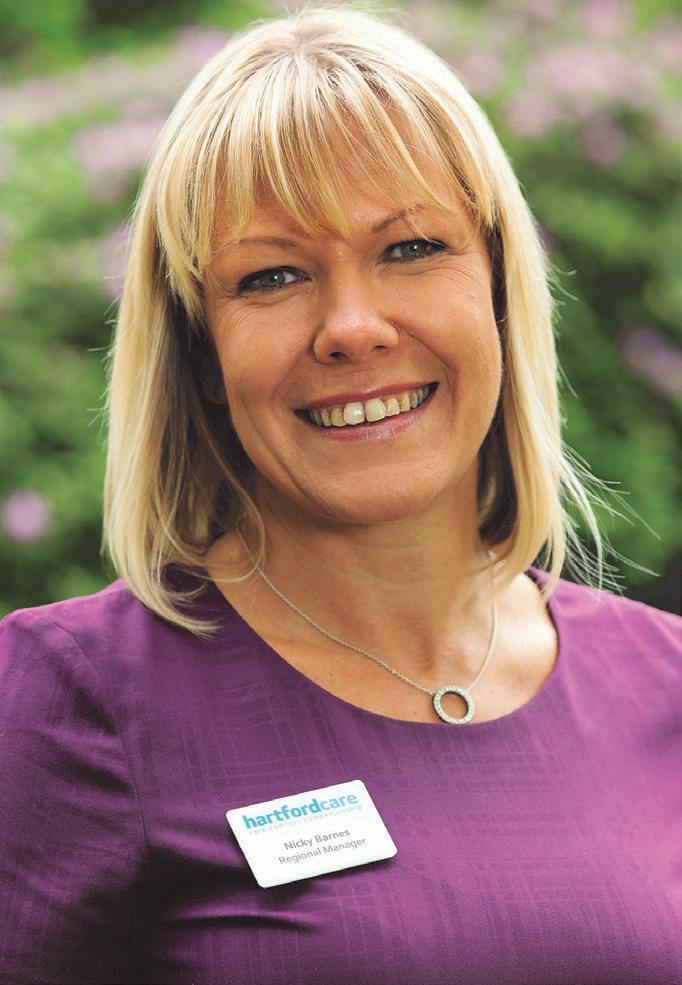
“ We were the first company in the UK to participate in a groundbreaking employment-led approach to refugee resettlement as part of the Communities for Ukraine programme, developed by Citizens UK and USPUK.”
national charities, along with working alongside local schools, pre-schools and churches, and various nurseries visit the homes. With our continued community focus in 2023, our homes provided collection points for people to donate goods for Ukraine and many of the homes also regularly collect donations for local food banks.
We look forward to continuing to create caring communities – existing and new – that are built on a solid foundation of sustainable practices.
Nicky BarnesCareTech group sustainability director Jonathan Freeman offers six new year sustainability resolutions
Iseems a long time ago already, but 2023 ended with a momentous shift in the global debate on tackling man-made climate change at COP28. Many, very understandably, felt our political leaders assembled in Dubai were shrugging their shoulders on tackling the climate emergency. But COP28 was historic as it was the very first time that world leaders came together and made a collective resolution to transition away from fossil fuels.
So, with world leaders having made this critical commitment, my mind turned to what my own sustainability commitments should be for the year ahead.
Resolution 1: Always give priority to creating long-term social value than short-term financial gain
The dictionary definition of sustainability is “the ability to be maintained at a certain rate or level”. It means looking at the long-term impact of our actions, recognising that (especially in the environmental context) we only have a finite amount of resources within which we have to manage. Turning a quick buck for individual benefit at the expense of creating long-term social impact for all is both morally objectionable and, in the long term, poor business sense.
Resolution 2: Always put quality provision at the top of our priorities
In social care nothing trumps the delivery of great care provision for those we are entrusted to support. High-quality provision should be the bedrock of our business and our sustainability approaches. Every decision in social care should start with a simple question: will this enable us to deliver better care for our clients? If we can’t answer this question positively, the debate should end there.
Resolution 3: Always ensure that commitments to the planet, our people and the communities in which we operate are at the heart of our corporate strategy
Sustainability is not a fad. It is not a ‘nice to have’, nor something to do when things are going well. Sustainability should define how we do business and should be reflected in every aspect of our corporate approach. To do otherwise is to misunderstand fundamentally what sustainability is about – and will always end up delivering poor results.
Resolution 4: Always seek to play a leadership role in the social care sector and contribute to its wider development
The pendulum on sustainability in social care has definitely shifted. It’s great to hear of new initiatives, new approaches and new players in the social care sustainability space each week. I am honoured to be the founder and chair of the Social Care Sustainability Alliance, which will hopefully be able to harness this enthusiasm and accelerate the scale and pace of change. The more of us that talk about this agenda and the more we help each other, the stronger and quicker that change will then be effected.
"Turning a quick buck for individual benefit at the expense of creating long-term social impact for all is both morally objectionable and, in the long term, poor business sense."

Resolution 5: Always place a premium on honesty, transparency and integrity in the way we do business
Sustainability is a journey, not a destination, and let’s face it, we’re all trying to work out the route. As we discover what works for us, it’s really important to share that knowledge openly so that others might be able to learn. Equally, we will make mistakes – and the learning from mistakes is just as valuable, often more so, than from successes. Making real progress on sustainability rests on the two key factors of intention and honesty –doing things for the right reasons and being open about where things have gone right and wrong.
Resolution 6: Always ensure your personal actions align with your words
Finally, my most important resolution is always to try to ensure that my personal actions align with my words. Practising what you preach is always important, but especially so when it comes to sustainability; persuading whole organisations to do the right –often difficult – thing will fall flat when others can see the gap between rhetoric and reality. I will no doubt fall short of expectations – my own as much as others – but I’ll do my best.
Care UK operations director Karen Seabrook shares how she managed the integration of 26 care homes under management contract from real estate investment trust Welltower
Karen Seabrook knows a thing or two about going through a major change in management. In August 2000, she was working as the registered manager at Kingsleigh care home when her employer, Surrey County Council, entered into an agreement with Care UK which saw both care homes and colleagues move under the Care UK umbrella.
“People were very loyal,” she says, of this time period: “I remember there being a period of uncertainty. No one really knew anything about Care UK then, and change makes anyone nervous.”
More than two decades later, when she was approached by Care UK chief executive Andrew Knight to manage the integration of 26 new homes under management contract from Welltower, Seabrook welcomed the challenge to oversee a successful transition. After managing several of Care UK’s new premium homes as well as contracts with councils in Islington, Surrey and Richmond, she felt her experience would enable her to align Welltower’s aims with the Care UK ethos.
Her challenge involved building a leadership team from scratch, overseeing the introduction of 2,300 staff to Care UK’s values and ways of
" I don’t think our new colleagues expected their operational director to join in with the day’s activities and have a singsong
or
dance with residents – but it definitely got people talking."
working, and supporting residents to ensure their daily life was not disrupted. Under Seabrook’s leadership, the homes have flourished as part of the Care UK portfolio. In 2022, her homes saw their profitability increase by 40%, and customer satisfaction grow by 3.2%. Her thorough implementation of Care UK practices – and the support and encouragement of new colleagues – has meant that care quality is continually improving, with two homes increasing their Care Quality Commission ratings from Requires Improvement to Good since the acquisition, and Halecroft Grange recently receiving an Outstanding rating. These ratings contribute to Care UK’s high standard of care quality, which currently has 91% of the provider’s homes as rated Good or Outstanding by the CQC.
There have been key points of learning along the way. Almost two years into the contract, Seabrook can reflect on the moments she and the team are most proud of and, crucially, what they’d do differently if a similar opportunity presented itself in the future.
“It sounds like a simple thing, but visiting the homes and meeting residents, their relatives and new colleagues was something that instilled trust from the start,” Seabrook says.
This was particularly challenging as the homes were still operating within coronavirus measures, but she was determined to make the most of her visits.
“I don’t think our new colleagues expected their operational director to join in with the day’s activities and have a singsong or dance with residents – but it definitely got people talking,” Seabrook says.
Expecting that some colleagues might be hesitant to transfer to Care UK, the team had prepared themselves for turnover at the beginning of the process. But by meeting and reassuring those most affected by the
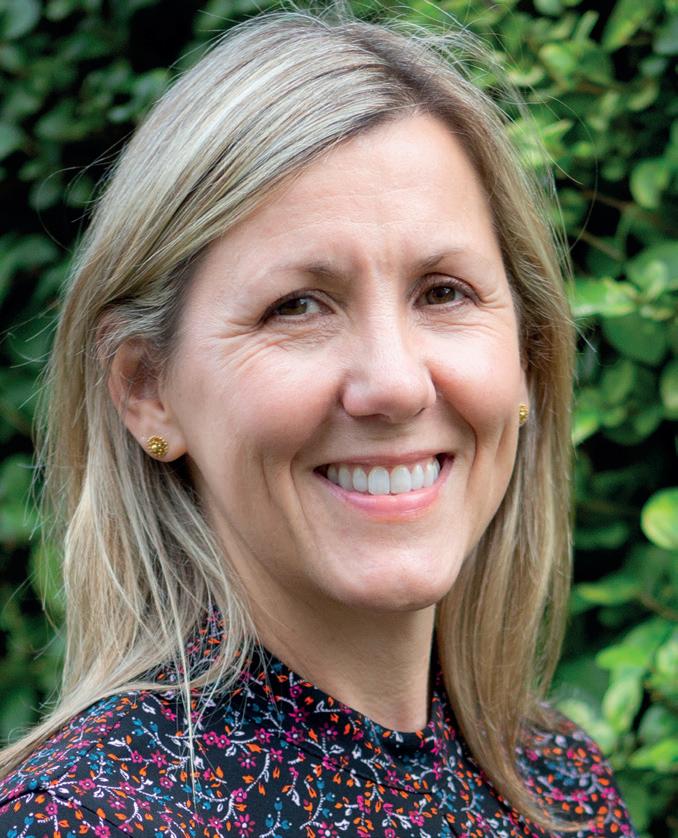
changes, Seabrook and her team could reiterate Care UK’s values of caring, being passionate and teamwork, and demonstrate them in action. This opened a line of communication which remains crucial to the division’s success and was particularly helpful during the transition.
Seabrook would host regular meetings, not just with the three regional directors, but also with each home manager, to understand the individual problems faced by each home and ensure she was accessible to answer any queries or solve any challenges.
And Seabrook believes her lifelong passion for mentoring colleagues was a strength she brought to her new role.
Seabrook says “progression should be celebrated and encouraged” and she saw opportunities for promotions at all levels, including promoting two home managers in her division to become regional directors.
Two of Seabrook’s former care assistants from her time at Kingsfield are now a regional director and a fellow operations director, respectively. Others are managers at care homes, such as Appleby House and Broadwater Lodge.
When Seabrook was announced as the operational lead for the Welltower
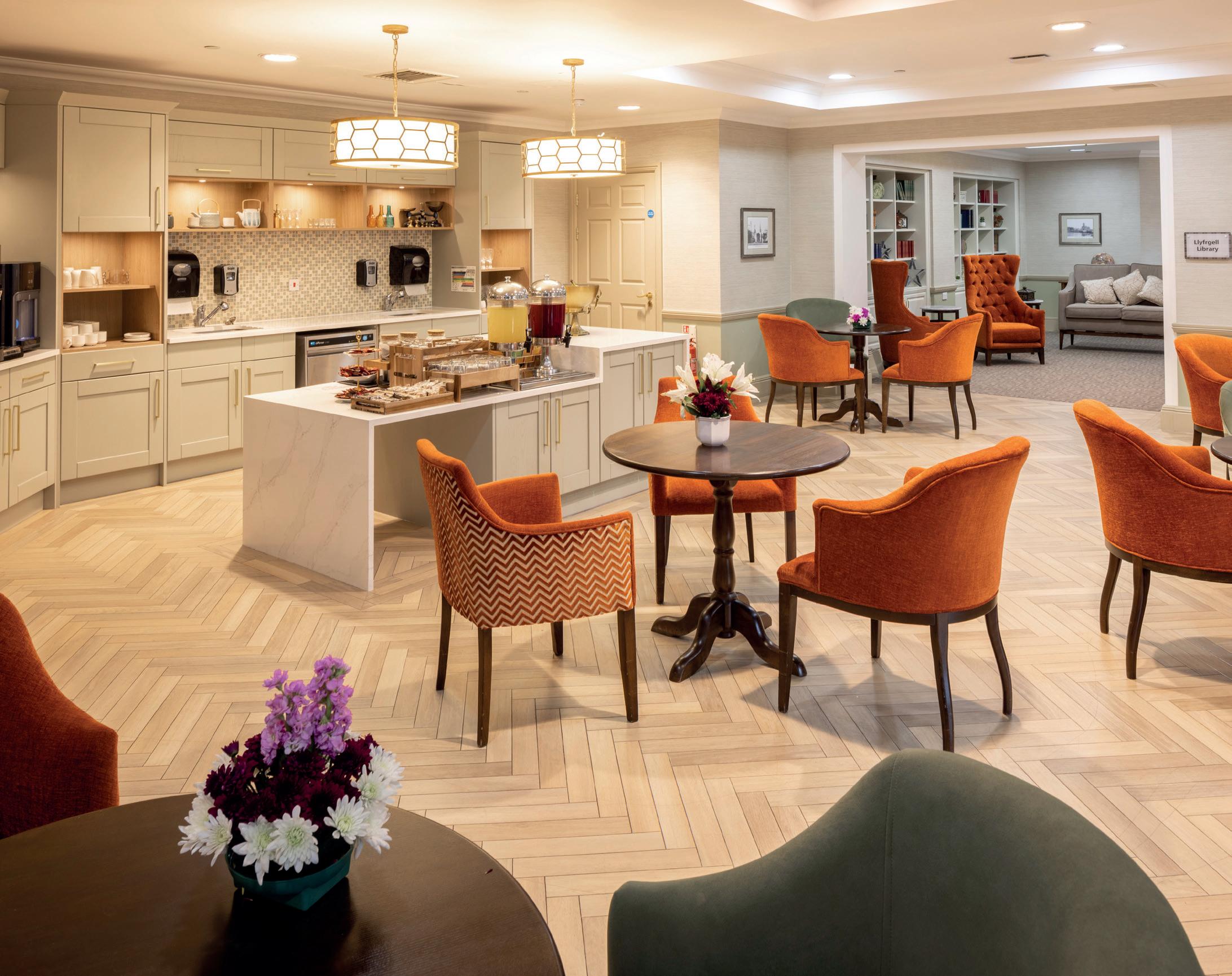
"It makes me very proud to be part of such a caring organisation that is willing to go the extra mile and dispel the myth that your life ends when you enter a care home."
project, which also led to the creation of a new division, a number of colleagues followed her, attesting to their unwavering confidence in her management.
Seabrook’s commitment to professional development ensures
training is a priority for all, and this has resulted in 135 internal promotions in 26 homes over the past year.
Keeping thorough records is an integral part of any project, but for Seabrook, they meant she and other Care UK teams could build a blueprint for any similar opportunities in the future.
On a practical level, Seabrook would encourage anyone leading a project of a similar scale to try and book time for yourself in-between meetings. This will ensure you can process the information you need to and also have time to cover welfare basics for you and your team.
Ultimately, Seabrook sees the Welltower contract as an indicator of how Care UK has established itself as a leading provider in the UK. When she joined the provider more than two decades ago, Care UK operated 36 homes across England. Now, there are 155 Care UK-run homes spanning the
UK, care quality is at 91% compliance and the company has become multi award winning.
The journey is not over yet, however, and over the next 18 months the focus for Seabrook and the team will be on maintaining and continually improving care quality, ensuring that properties and facilities are in line with similar homes within Care UK and developing the leaders of the future.
Seabrook says: “This is definitely the most challenging job I’ve had so far in Care UK, but it is absolutely the most rewarding. I look at residents and see that – thanks to our Wishing Tree initiative – they’re getting their first ever tattoos or jumping out of planes. It makes me very proud to be part of such a caring organisation that is willing to go the extra mile and dispel the myth that your life ends when you enter a care home. It doesn’t and Care UK is proof that anything is possible.”
M&A
Prime Care acquired the freehold of Burlington Nursing Home in Bognor Regis, West Sussex, registered for 40 service users in 36 rooms, 21 of which have en-suite facilities. The property comprises two attached properties which have been extended and upgraded over the years, as well as a large garden with secure outdoor space.

Choice Care acquired The Beeches in Clydach on the outskirts of Swansea, a specialist care home registered to provide care to up to nine adults with mental health conditions, a number of whom have underlying learning disabilities.

Real estate lender and investor Octopus Real Estate added Manor Farm in Old Malton, North Yorkshire to Octopus Healthcare Fund’s portfolio of more than 100 care homes.

Welford Healthcare purchased Langford Park Nursing Home in Exeter, a former residential property that has been modified and improved to accommodate up to 35 residents across 35 bedrooms. The vendor was Vision UK and was brought to market
to enable the directors to focus on other business interests both within and away from the care sector.

Parklands Care acquired Craigard Care Group, a portfolio of three care homes on behalf of the joint administrators Graham Smith and Tom MacLennan of FRP Advisory.

Newcomers to the care home sector Dr Daljinder Bajwa and Gurpreet Singh Jassal purchased The Firs Residential Home in Breaston, Derbyshire, which is registered for 28 service users. The home occupies a two-storey, detached property with 25 bedrooms, six of which have en-suite facilities, and includes a garden area with a covered pergola.

Hull-based social care group HICA Group purchased Fairways Care Home
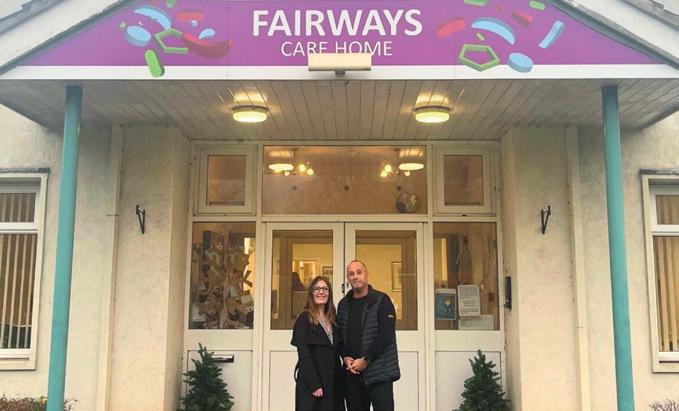
in Grimsby from Care Plus Group for an undisclosed price. Fairways Care Home is a 55-bed single storey, purpose-built home located within a large landscaped site, providing residential and dementia care.
Palm Court Care (Dawlish) acquired Sidmouth Residential Nursing Home in the regency resort town of Sidmouth in Devon, which provides accommodation for up to 29 elderly residents. For more than 20 years, the home has been owned by Sam Bevan who retired overseas a few years ago, leaving it to be operated by her friend Julie Casely, who’s own retirement has led to the business’s sale.

Signature Senior Lifestyle opened a £50 million care home in Highgate, North London. Founding resident Mary Sumeray cut the ribbon to launch Signature at Highgate at an opening ceremony attended by Professor Martin Green, chief executive of Care England, Jayne Connery, founder of Care Campaign For The Vulnerable, and Care Workers’ Charity representatives.

Care UK held a ‘topping out’ ceremony to mark the placing of the final roof tile on Ladden View in Yate, the company’s second care home in the Bristol area. The Care UK team and representatives from contractor Kori Construction were joined by the mayor of Yate, Councillor Cheryl Kirby, and the deputy mayor of Yate, Councillor Ben Nutland, who placed the final roof tile on the roof of the home.

The mayor of Bolton, Councillor Mohammed Ayub, along with the council’s cabinet member for adult social care, Councillor Linda Thomas, officially opened a new £13 million care facility in Bolton. Built on the former site of Egerton House Hotel, New Care’s Egerton Manor is a purpose-built, 64bed care centre providing residential, nursing, dementia and respite care.
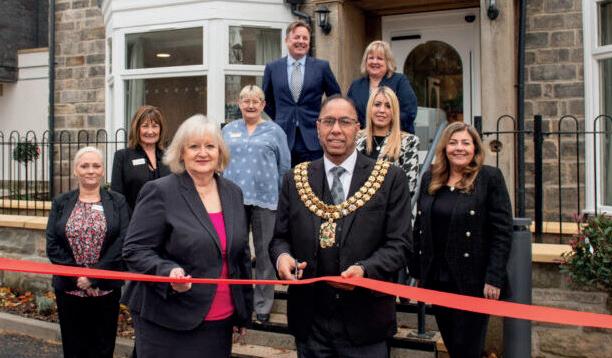
Audley Group marked the official launch of its second retirement village in Buckinghamshire. Featuring 156 properties set in 25 acres at Horsleys Green, Audley Wycliffe Park is a joint venture with Royal London Pension Property Fund, which made its first investment into the retirement living sector.
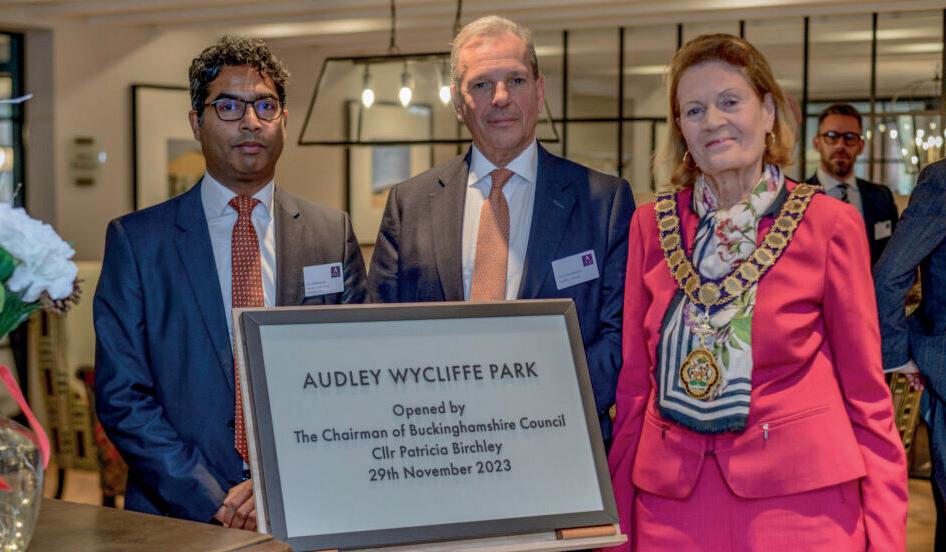
Real estate developer and investment company Simply UK completed its latest development, at Escan Manor in Exeter, bringing its tally of completions in the past 12 months to seven new care homes adding more than 500 beds.

Glasgow-based Morrison Community Care Group announced plans to develop a luxury 70-bed care home in Leicestershire. The home, which will include a cinema, hair salon and champagne bar, will be Morrison Community Care Group's fourth care home in England. The company also has five properties in Scotland, with 11 further sites under development in the UK and Ireland.

Nottingham City Council announced plans to close two care homes as part of a bid to close a £50 million funding gap. A range of savings proposals to the council’s executive board include the closure of The Oaks and Cherry Trees Residential Care Homes as well as a home care and respite service.

The former Highfield Residential Home in Marlborough, Wiltshire was put up for sale for £1.5 million for the freehold. The home’s owners ran the business until it ceased trading last September. The home is being sold as the owners want to concentrate on other business interests.

The Oaktree Capital Managementbacked development lender Silbury Finance provided a £66.5 million loan to a joint venture vehicle established
by Audley Group and Senior Living Investment Partners, the partnership between Pension Insurance Corporation and Octopus Real Estate.

Development finance lender
Atelier provided finance facilities totalling £23.9 million for two new care homes. The two loans provide £14.6 million to build a new 131-bed home in West Yorkshire due for completion in April 2025, and £9.3 million for a 60-bed home in Cheshire to be built on the site of a former care home, extending the capacity of the site.
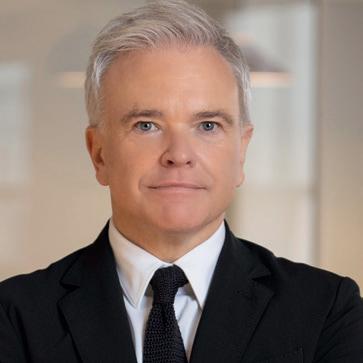
Adlington Retirement Living secured a £75 million development facility from NatWest Group and Homes England to accelerate its pipeline of integrated retirement communities across England. NatWest is providing the senior debt and Homes England the mezzanine tranche.

Retirement living provider Audley Group secured a five-year, £28.5 million financing facility, provided by investment manager Federated Hermes. The loan facility will focus on six fully developed and sold-out villages within Audley Group’s portfolio.

Healthcare regulatory partner Amanda Narkiewicz from law firm Mills & Reeve asks whether the Care Quality Commission should persist with one-word ratings in light of the coroner’s conclusion in the Ruth Perry inquest
The damning conclusion that an Office for Standards in Education, Children’s Services and Skills (Ofsted) inspection "contributed" to the death of headteacher Ruth Perry will probably resonate with care home managers and care providers up and down the country. It is said to be the first time Ofsted has been listed as a contributing factor in the death of a headteacher.
Senior coroner, Heidi Connor, concluded that Perry’s suicide was “contributed to by an Ofsted inspection carried out in November 2022” at her primary school in Reading. Connor said the inspection “lacked fairness, respect and sensitivity” and was at times “rude and intimidating”. Ofsted resumed school inspections on 22 January following a pause to train staff on considering the wellbeing of heads and teachers.
Coroner’s concerns
Connor says in her Prevention of Future Death (PFD) report that the current Ofsted system allows for the single-word judgement of Inadequate to be applied equally to a school rated otherwise Good, but with issues that could be remedied by the time the report was published, as to a school receiving the same rating as one failing in all areas. She is concerned about the “impact on school leader welfare that this system may continue to have”.
This is a not an uncommon issue for care providers where concerns can be remedied quickly and before
"Many argue that one-word ratings often tell a partial story and risk weakening services that inspectors are seeking to improve."
the publication of the Care Quality Commission’s rating. The roll-out of the CQC’s new Single Assessment Framework and its aspiration to be a dynamic regulator should mean that, in future, ratings are updated in a timely way once concerns have been remedied. However, how dynamic the CQC’s new approach will be in practice remains to be seen.
Other concerns in the PFD report include:
• The complete absence of Ofsted training or published policy in the following areas:
o Signs of distress in school leaders during an inspection.
o Practical steps to deal with such distress.
o Pausing an inspection by reason of the distress of a school leader.
o Who can attend meetings with the inspectors during the inspection process.
• The absence of a “clear path to raise concerns during an inspection if these cannot be resolved directly with the lead inspector”.
• The confidentiality requirement after an inspection. The coroner acknowledges that some changes have been made already, but this is not yet written into policy.
• Timescales for report publication.
• The absence of learning reviews conducted by Ofsted; currently there is no policy requiring this to be done.
The health and care regulator’s Ofstedstyle ratings were prompted by the Mid Staffordshire NHS Foundation Trust Public Inquiry in 2013. The switch from the CQC’s widely criticised hospital monitoring system was ordered by then secretary of state for health, Jeremy Hunt, in the wake of Sir Robert Francis KC’s report into the poor standards of care at Stafford Hospital where up to 1,200 patients died. The
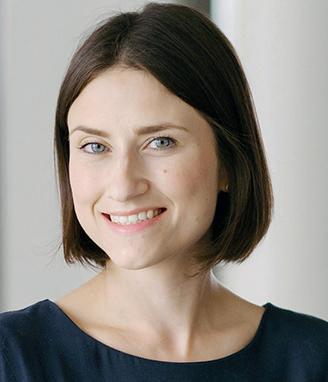
new approach was adopted in the hope that it would drive up improvements in care as inspectors would be inspecting services against five key questions –is the service safe, caring, effective, responsive to a person’s needs, and wellled? – before giving a rating.
The Ofsted-style inspection included the introduction of a four-tier ratings system which saw services rated as Outstanding, Good, Requires Improvement or Inadequate.
The then chief executive of CQC, David Behan commenting on the new approach, said: “It’s going to be tougher and much more rigorous, and will be much more clear about when services are failing or inadequate.”
As the CQC rolls out its new Single Assessment Framework, it will continue to deliver one-word ratings despite many care home operators favouring a narrative judgement. Many argue that one-word ratings often tell a partial story and risk weakening services that inspectors are seeking to improve.
The question remains, with Ofsted’s single-word ratings of schools under scrutiny, should the CQC be persisting with one-word ratings going forward?
Learning disability charity Hft appointed Steve Veevers as its chief executive, replacing Kirsty Matthews who stepped down after three years in the role. Veevers has more than 25 years’ social care and health experience, having worked as a senior leader for national and regional not-for-profit care providers and local government, as well as undertaking consultancy work. He was previously managing director of not-for-profit adult care provider Care Dorset, corporate director of adult social care for Dorset Council, and a senior executive at learning disability charity Discovery.

Commander Brian Boxall-Hunt retired after 17 years as chief executive of The Royal Alfred Seafarers’ Society. Captain David Dominy is taking over leadership of the society which cares for more than 60 residents and tenants at its home Belvedere House in Banstead, Surrey.
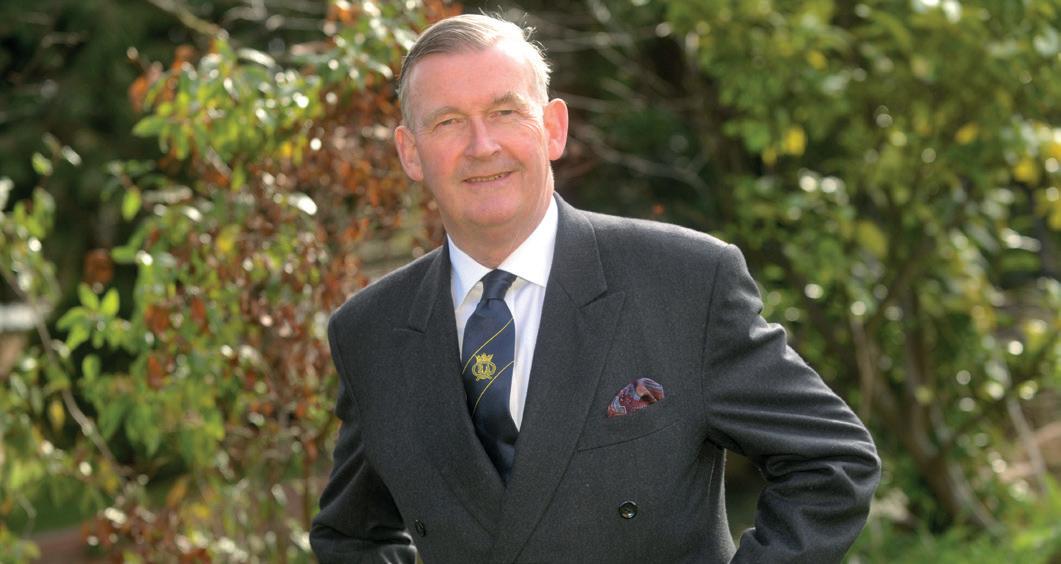
Retirement housing provider Audley Group has appointed Emma Robinson as health and wellness director to head up all aspects of health and wellness across the company, reporting to chief executive Nick Sanderson.


Audley Group appointed Gary Burton as chief operating officer, to add to his current role as chief financial officer. Audley also appointed group general counsel Mark Sadler to its board. Sadler joined Audley Group in 2021 from Intu Properties, where he was a senior legal counsel advising on M&A, joint ventures and financing. Over the past two years Sadler has supported the company’s investment activity, advising on transactions, operations, compliance and governance.
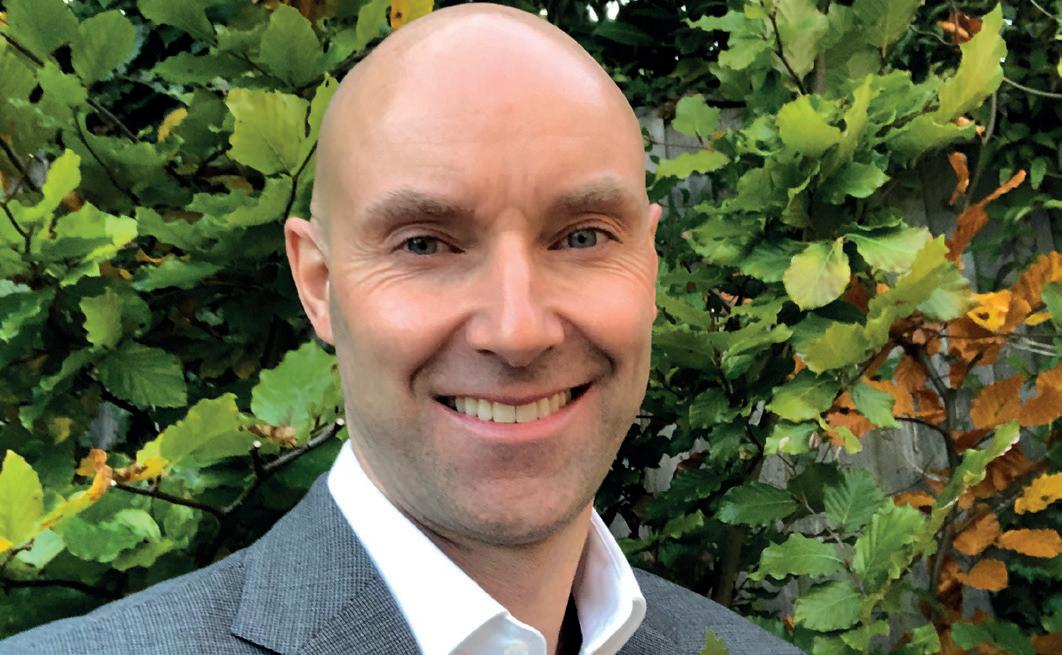


Law firm Mills & Reeve appointed Dan Braithwaite as a principal associate in its health and social care mergers and acquisitions practice. He will work closely with health and care M&A lead partner Julian Smith, Natalie Wade and Paul Krivosic on the team’s work with clients embarking on major corporate projects, including acquisitions, disposals, joint ventures and shareholder collaborations in the health and care sector.
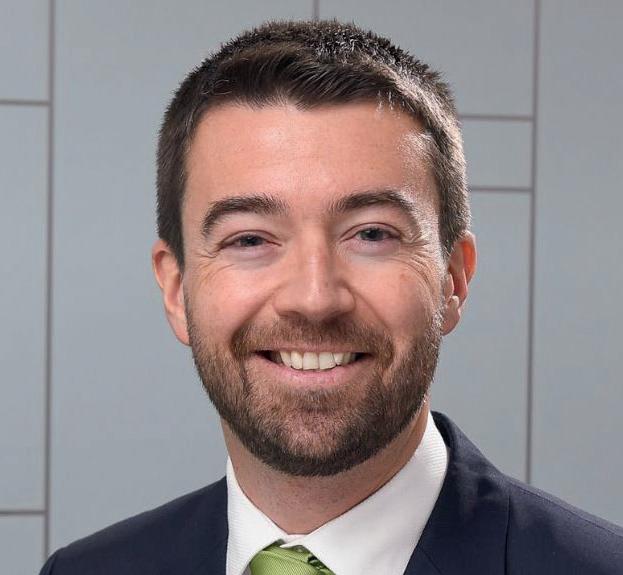
New Care appointed Eduardo Buglosa Jr as home manager of Guiseley Manor in Leeds, a 74-bed care facility which opened last July, offering residential, dementia and 24-hour nursing care. Buglosa has been a registered nurse for more than 16 years and joined New Care in 2020 as clinical lead, progressing to deputy manager, regional quality lead and interim home manager. He recently completed his MVQ 5 diploma in leadership and management in adult and social care.

Later-living developer and operator Untold Living has appointed Lex Cumber as sales and marketing director. Cumber joins Untold from later-living proptech firm Aline (formerly Sherpa)
which provides tech solutions and sales training to later-living sales teams. Before that he was head of membership and operations at ARCO, the national body for operators of UK integrated retirement communities (IRCs). He has experience of developed and building IRCs from working at Castle Oak and Mi-space, part of the Midas Group.
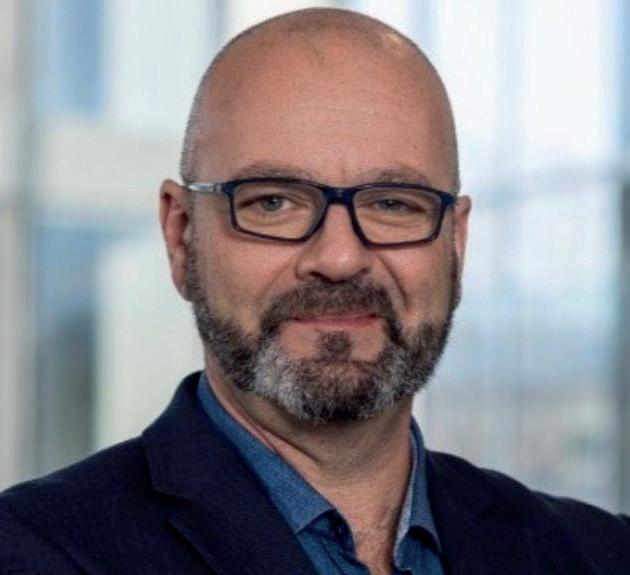
Malcolm Hanson was appointed care home manager at Solehawk’s Kenton Hall care home in Newcastle upon Tyne, which provides residential, nursing, palliative and respite care for private and local authority-funded residents. Hanson has 17 years’ management experience and a career spanning 33 years in the NHS and health and social care and has been a registered general nurse for 20 years. He previously managed sister home Craigielea care home in Gateshead.
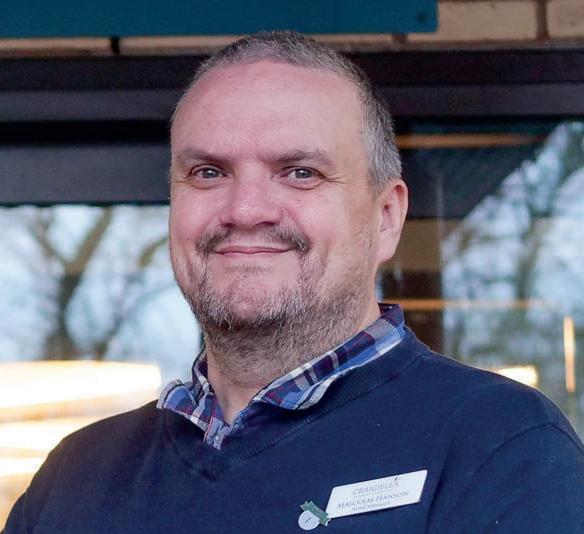
Liaise, a provider of residential and supported living services for people with learning disabilities, autism and complex needs, appointed Mark Sherriff as chief commercial officer. Sherriff has almost 15 years’ experience in various executive roles within the health and social care industry. His career began in the elderly care sector,
at organisations including Care UK and Caring Homes and transitioned to the specialist care sector, in senior roles at Consensus, Achieve together and Glenholme Healthcare.

Gold Care Homes announced the death of co-founder and chairman Ravi Gidar, who sadly passed away just before Christmas at his family home at the age of 64. He cofounded Gold Care Homes with his brother Sukhi in 1999 with the opening of Queensway House in Hemel Hempstead, Hertfordshire and continued to grow the company, most recently with the acquisition of three new services in London.


Lee Peart finds out how London luxury retirement operator Riverstone helps residents live the life they want to live
Retirement life at Riverstone Fulham is all about its desirable location on the north bank of the River Thames in fashionable Southwest London.
“Every apartment either has a riverside, garden or courtyard view so you are bringing the outside in,” says chief commercial officer Shannan Hodgson.
Each of the 161 one-, two-, and threebed apartments, which range in price from £860,000 to more than £6 million, has its own terrace or balcony.
“We made it part of the strategy for us to make sure that people have that private space to be outdoors and have that sense of wellbeing,” says Hodgson. “Every apartment has a terrace which is quite unique and allows residents to be outside and get fresh air.”
The residence apartments face onto a large central garden courtyard developed with the input of Chelsea Flower Show garden designer Andy Sturgeon where residents are able to wander and tend to raised garden beds or take part in communal activities.
The Fulham residence is situated close to Riverside’s first development, Riverstone Kensington, with facilities and services shared between the sites.
“The nuance at Riverstone is the fact that you have two residencies which you can enjoy with being part of the Riverstone Club,” says Hodgson. “Whether you have the golf simulator here or the recovery suite at Kensington, residents have the choice and the ability to appreciate both. The ability to have that in London is quite unique.”
Riverstone is also developing two new residencies in Bishops Avenue in North London opening next year and King’s
Riverstone’s leadership team
Investor Goldman Sachs
Chief executive Martin Earp

Road in 2026 and has the long-term aim of having six sites in the capital with club members sharing access to each others services.
The Kingfisher Wharf riverside event venue, opened by Riverstone last November, adjoins Riverstone Fulham and provides year-round events for residents and the local community. This includes an agreement with Hammersmith Council to use the site for school education.
Riverstone Fulham’s Maria G’s bar and restaurant is also open to passersby who wander the Thames waterfront.
“We are saying to the community come in and let’s try and integrate as much as possible,” Hodgson notes.
Apartments are built to Lifetime Home Standards with the ability to make adaptations for futureproofing.
“We have the ability to make adaptations depending on how small or big your needs are,” Hodgson says. “We do it in a way that is really discrete and that makes you feel you are not having

to live differently. Telling residents that any adaptations they need can be done is hugely reassuring to them.”
The Riverstone Club
Care valet services and shuttle cars are provided as part of annual membership fees which range from £16,000 to 20,000 per annum, subject to apartment size. There is also a deferred management fee calculated by accruing a 4% charge per year of ownership that will never be more than 28% of the sale price (that is, capped at seven years). Membership fees also cover round-the-clock 24/7 concierge services, access to amenities and regular social and educational events, as well as day-to-day services, safety and security.
Founders Paul Pheysey, chief investment officer; Julian Mercer; Paul Vesty, chief development officer Board members Penny Hughes, chairman; Dr Jane Macdonald, non-executive director >
Health and wellbeing Hodgson says the 24-hour reception and concierge, and fundamental focus on wellbeing are Riverstone's USP. Health and wellbeing services are led by wellbeing director Dr Zoe Wyrko, a consultant geriatrician by trade, who spent 21 years in the NHS before moving into the private sector.
The wellbeing team meets with residents before they move in with Riverstone. Once they move in, they are given an introduction to the residence’s health and wellbeing services by one of two wellbeing ambassadors who are trained in clinical physiology and nursing.
“We do a full MOT or comprehensive geriatric assessment,” Wyrko says.
The informal consultation covers everything from end of life plans and


lasting power of attorney to general health matters such as continence, eye health and podiatry.
“We help them follow through on the advisories because doing all of this stuff means they can get on with living,” Dr Wyrko says. “We talk about the life you want to live, so you can get on and do that stuff.”
Healthcare services also include access to care through Riverstone’s partnership with The Good Care Group and the 24/7 Doctorcall healthcare service which provides 30-minute urgent appointments with private GPs within three hours.
Wyrko emphasised Riverstone’s preventative and early intervention approach to physical and mental health.
“Older people don’t tend to be afraid of dying,” she says. “The bit they are afraid of is not being the person they recognise in the mirror anymore and not being able to do the things that they want to do that are important to them and losing their independence and sense of self, which is


so much of what frailty does. What we do here is try and help avoid that.”
Fitness programmes built around what matters to residents, focused on muscle and core strength and balance, have achieved amazing results.
“We have people who have stopped using their walking sticks because they are feeling more confident and feeling stronger,” Wyrko says.
Mental health support is also provided with the service offering six-week courses on brain strength covering cognitive impairment, dementia, depression and mental health. Residents are also signposted to activities that can boost mental health such as playing bridge or learning a new language.
It’s a comprehensive, holistic wellbeing approach designed to meet Riverstone’s brand ethos of enabling residents to live the life they want to live.
“We won’t add years to your life, but we will definitely add life to your years,” Wyrko concludes.

42 THANK YOU FOR THE MUSIC!
The Spitz Charitable Trust celebrates its 10th anniversary
30 MANAGER'S GUIDE TO Jo Mason on intergenerational activity
31 CHEF OF THE MONTH
Colten Care's Jack Wood of Brook View care home
32 10 QUESTIONS WITH Jiji George, home manager of Bupa’s Colonia Court
33 CPD
#KeepLearning in 2024
36 WELLBEING
Adopt a Grandparent leads the fight for companionship
38 CARE FOR TOMORROW
AgeCare UK transforms through digitisation and Guided Innovation assesses the best care planning systems
42 CHARITY FOCUS
The Spitz Charitable Trust celebrates its 10th anniversary
43 CREATIVE CARING
Carers demonstrate their creativity through fun and engaging activities
46 NORRMS' BLOG
The moving dementia diary of Norrms' McNamara
47 HOUSEKEEPER OF THE MONTH
Marina Holder of Stow Healthcare Group’s Stowlangtoft Hall Nursing Home
Building connections between the older and younger generations provides mutual enrichment, says Jo Mason, co-lead at AHN Training and Education
AHN Training and Education offers the first NCFE-accredited Level 3 intergenerational courses in the UK. We are passionate about ensuring intergenerational practice becomes ‘the new normal’, enabling older people to continue to feel valued and children and young people to develop into effective, compassionate adults.
1. Set clear goals. Define the desired outcomes of your intergenerational space, whether that is focusing on reducing social isolation, enhancing cognitive function, or simply fostering meaningful connections.
2. Assess resident preferences and abilities. Involve residents in the planning process, considering their physical and cognitive limitations, interests and comfort levels. Respect individual needs and preferences. Ensure inclusivity by offering a variety of activities.
3. Identify potential partners. Contact nurseries, primary schools, secondary schools, youth groups and volunteer organisations to establish partnerships.
4. Create a welcoming environment: Ensure the physical space is safe, accessible and comfortable for both generations, fostering a sense of shared ownership and belonging.
5. Ensure regular communication between partner organisations. Poor communication is usually the area that causes projects to fail.
6. Train staff. Equip your staff with the knowledge and skills to facilitate activities effectively, fostering inclusivity and addressing potential challenges. Address ageism and stereotypes, encourage open conversations and provide staff training to promote understanding and respect for intergenerational relationships. Consider offering training to the partnering organisation so that they understand
the needs of their ‘grandfriends’ when preparing for and planning programmes together. ANH Training and Education offers a range of training, including a professional and non-professional pathway, as well as a one-week summer school.
7. Evaluate and adapt. Regularly assess the effectiveness of your programme, incorporating feedback from residents, staff and partners to improve and adapt activities to their needs.
8. Comply with health and safety. It’s crucial to ensure you comply with relevant UK legislation. Implement clear safety protocols and supervision policies to ensure the safeguarding, comfort and wellbeing of all participants. Design your activities to be inclusive and accessible, accommodating diverse needs and abilities. Make sure activities comply with health and safety regulations, providing necessary supervision and adapting activities to cater for varying physical abilities.
Key legislation to consider includes the Care Quality Commission Regulations, the Health and Social Care Act 2008, the Equality Act 2010 and Safeguarding Vulnerable Groups Act 2006. If you collect any
personal data during activities such as photos, ensure compliance with data protection regulations regarding consent, storage and security.
9. Review your insurance coverage to ensure it covers intergenerational activities and any potential risks involved. Obtain informed consent both from residents and younger participants before proceeding with activities. Maintain clear communication with families and guardians, especially regarding safeguarding concerns. Always seek professional guidance if needed, especially regarding complex legal matters.
10. Get creative. Activities could include ‘ask me anything’ sessions where residents share life experiences with younger visitors, intergenerational baking sessions or karaoke nights. Encourage residents to read favourite childhood stories to visiting children, foster intergenerational art projects and create accessible garden spaces where residents and young visitors can work together. Host intergenerational game nights or set up a book clubs where both older and younger participants share their favourite reads.
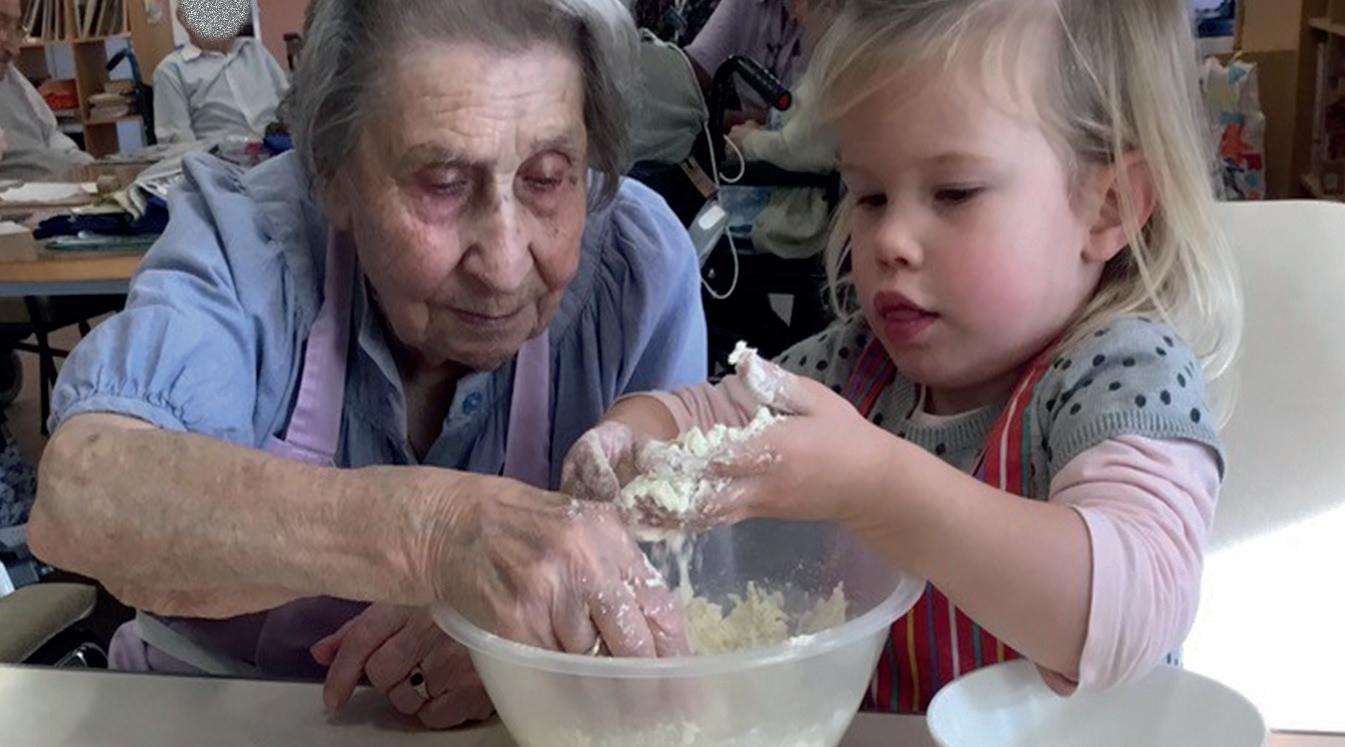
Tell us about your background and how you joined Colten Care?
I joined in January 2022. My background is in fine dining. I’ve worked in restaurants that have two AA Rosettes and are Michelin-recommended. I did a catering course at The Bournemouth and Poole College and met a lady there called Annabell Bryer who is another Colten Care chef. She told me good things about Colten Care, including about the pay and hours.
What is special about working at Colten Care?
It’s lovely when you see a resident light up with appreciation when you serve them something they enjoy. And as an employer, Colten Care offers me a better work-life balance than the hotel or restaurant trade.
How do you vary your menu to provide choice for residents?
It’s all about choice. Our food is as high standard as anything you would find in a restaurant. We continually supplement and complement our menus with residents’ choices and dietary requirements.
What does your typical weekly menu look like?
We have roasts twice a week: on Wednesdays and Sundays. That could be chicken, beef or pork. And we have poached or battered fish on Fridays. There’s always a vegetarian and glutenfree alternative and options that cater for allergens and modification of food where needed. Curries are always on the menu because they are so popular among residents. Liver and bacon is another favourite. All our menus are catered towards seasonal variations with dishes that feature good-quality local produce.
How do you meet residents’ nutritional and health needs?
I can adapt most things to fit each resident. We work closely with clinical colleagues. We have a set weekly

meeting with them where we look through residents’ dietary needs and wishes. Some people need high calorie milk shakes, extra portions of fortified foods or we have to adapt meals for those who struggle with dysphagia. If someone has a dairy intolerance we prepare, for example, a chicken and leek pie that is dairy free and still tastes really good. I’d challenge you to taste the difference.
How do you cater for residents with dementia?
We chat with everyone and keep a discreet eye on what has been eaten. A resident with dementia may quickly forget they have had lunch or be intimidated by a large portion. In such cases we may give smaller portions more than once if needed. It’s about knowing our residents well, so you give the best care possible.
What is your most popular dish?
We get lots of lovely comments whenever we serve a pie. A fish pie featuring pan-fried sea bass with Mediterranean vegetables would be up there as most popular.
What is your own favourite dish?
I really enjoy gala events and functions where you have the chance to do something a little special and out of the ordinary. It’s really fun to plate a dish such as a pancetta-wrapped chicken breast with pesto stuffing – delicious, amazing food.
How do you make the dining experience special for residents and their families? We aim for a wonderful experience every mealtime. Our table service and settings are up there with a five-star hotel. At events we have proper silver service. Our waiting staff wear bow ties and waistcoats and you see them polishing glasses to prepare and make sure everything is spot on. Another thing that makes it special for residents is when you as a chef go out and have a chat with them. They really appreciate seeing the chef’s face and having that interaction. It’s great to see the food we have prepared and cooked being enjoyed. I’m also fond of offering an amuse-bouche, a bite-sized hors d’oeuvre. I recently created a platter of triangular cake canapes from a pumpkin cake. The residents loved it.
Why did you join the social care sector?
I worked as a nurse in a hospital setting while living in India and the UAE, but I wanted a new challenge. Bupa gave me the opportunity to work in a care home in order to qualify as a nurse in the UK.
Once I started at Colonia Court Bupa Care Home I never looked back. I gained my nurse PIN and then worked my way up from registered nurse to senior sister and clinical services manager before becoming home manger in 2021.
What do you enjoy most about your job?
One of the best things about my role is knowing I am making a difference to the lives of our residents and their families. I also get to put my nursing knowledge to use in the running of the home and making sure that all our residents get the highest-quality individualised care they deserve. The great thing about working in a care home is you get to know the residents over a long period of time – it’s not like working in a hospital where you only see people for a few days. At the home it feels like we’re one big family. I also love to see the team get the recognition they deserve for their hard work. We recently gained ‘quality assured’ status from the Huntington's Disease Association in recognition of all the amazing work the team does to care

for residents with Huntington’s. We’re one of only five homes in the country to have this qualification and I was so proud when I heard we had been successful.
Who is your social care hero and why?
When I was training to be a nurse I was very inspired by Florence Nightingale. She reached out to help people without any bias or prejudice, and she professionalised the nursing profession, helping people to understand the importance of good nursing. Now that I work in the care sector I find that very inspiring.
What one thing would you change about social care?
I would like more people to understand the value of social care and recognise the important work that people in the caring profession do.
What makes a great care worker?
Anyone can make a great care worker, but I think a caring nature is a great starting point. Being dedicated, a good listener and being open to learning new skills will also help.
Making time for meaningful conversations with your colleagues and residents is also important. Following up on what you say you’ll do might sound like a small thing, but it makes a big difference to people’s lives.
What do you do when life gets a bit too much?
Life and work can get busy, but I try not to let that affect me too much. Instead, I go to church, and sing in the choir. Like lots of other people I enjoy watching TV in the evening with my family, or cooking a delicious meal. In the summer I enjoy working in my garden.
What advice would you give your younger self?
I would remind myself always to focus on the positives – this is something I

try to live by now. Remember to learn from your mistakes, believe in yourself and don’t lose sight of your dream.
Which three famous people would you like to have dinner with and why?
I’m a big Mr Bean fan so first I’d have to say Rowan Atkinson. Then one of my personal heroes is Bollywood star Shah Rukh Khan – I loved his movies in the 90s. And finally I’d say King Charles, because I’d love to visit Buckingham Palace.
What three items would you take to a desert island?
I am quite a practical person so I would take a tent or a hammock to sleep in safely at night and matches and a knife so I could find and cook food. But really I’d like to take my iPhone so I could take pictures of the desert island to show my friends and family.
What is your secret talent?
I would say that my secret talent is singing. I sing in my church choir but not many people know that; it really is a secret!
Skills for Care’s head of national workforce development, capability and skills Rob Newby is encouraging care workers to continue learning and outlines the support available
I’m delighted that Skills for Care is once again kicking off the new year with our #KeepLearning campaign, supporting everyone working across social care to focus on their learning and development goals for 2024.
Learning and development is key to an organisation’s success. Investing in learning and development supports better staff retention and helps to develop effective mangers for now and the future, which supports better quality care and support.
This year’s campaign will raise awareness of the learning and development and continuing professional development opportunities available to support best-quality care.
Ensuring staff’s skills are kept up to date is vital in continually providing the best possible care to the people you support. As well as maintaining skills and knowledge, providing learning and development for your team will also enhance their confidence which will again support them in delivering the best-quality care.
Beyond that, ongoing learning and development can really improve job satisfaction and the feeling of reward and recognition for staff. Because of this, learning and development plays a key role in increasing staff retention rates.
We know from our data that people who are provided with regular training are more likely to stay in their roles for longer. In fact, the average turnover rate
"We know from our data that people who are provided with regular training are more likely to stay in their roles for longer."
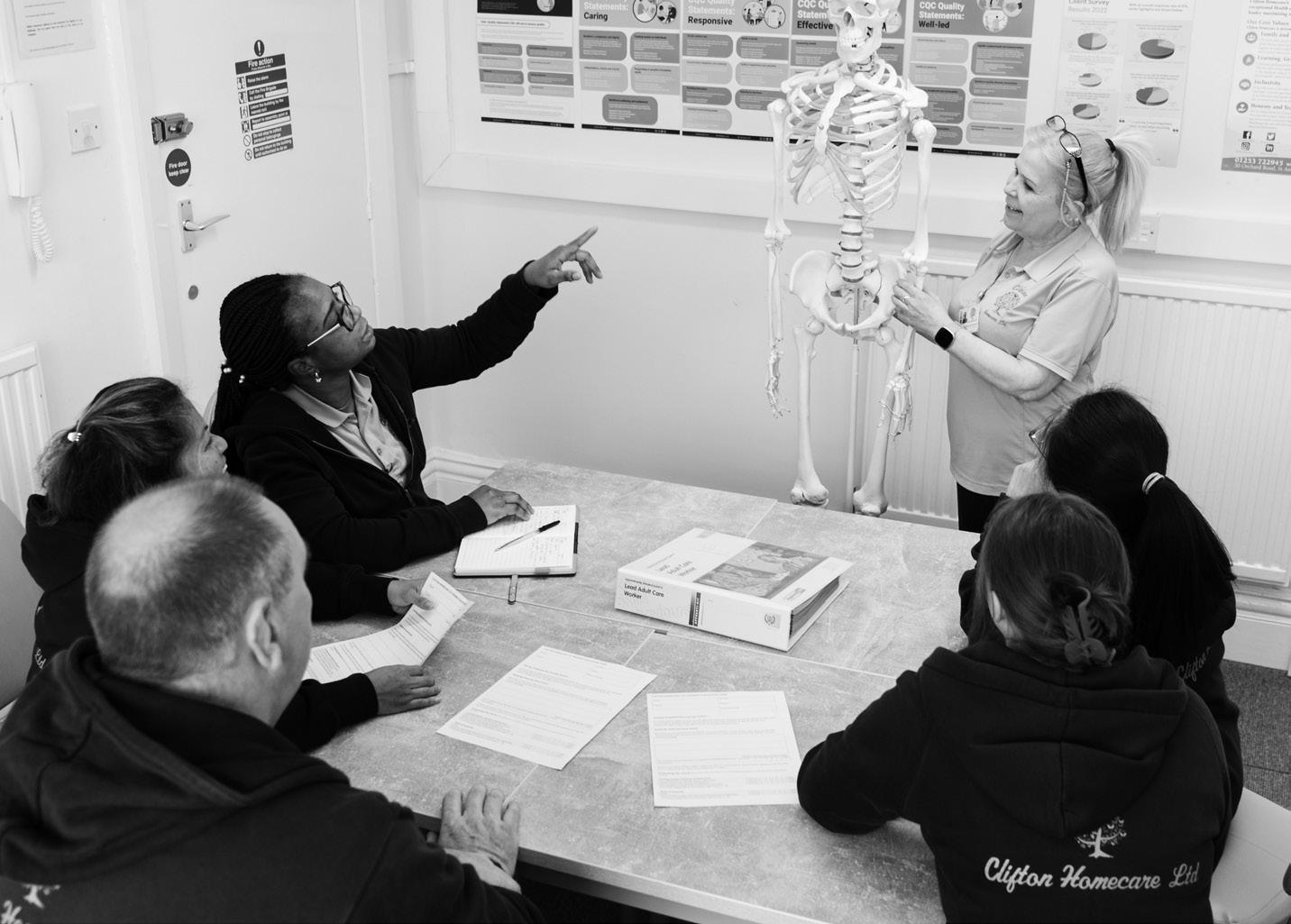
was nine percentage points lower among care workers who had received some form of training (31.6%), compared to those who had not (40.6%).
Additionally, average turnover rates decreased from 37% among staff who had no qualifications to 26.5% among those who had a qualification.
It’s really important that people at all levels are provided with the opportunity to enjoy ongoing learning and development, and so in our campaign we’ll be discussing the learning opportunities available for aspiring, new and experienced managers.
As we launched this campaign, we were pleased to also see an announcement from the government about its new reform package, including the first iteration of the Care Workforce Pathway and the new care certificate qualification.These are important new developments which will play a really positive role in supporting learning and development for social care staff this year.
The Pathway will help to articulate what a career in social care means and what is expected of those supporting
people who draw on care and support.
Previously, there was no consistent career structure or clear articulation of the level of knowledge, experience and skill required to deliver high-quality, personalised care and support. We recommend everyone new to social care completes the care certificate as part of a robust induction process. The new developments to the certificate mean this will now be a recognised qualification, something the sector has wanted to see for a long time.
Skills for Care has been working on developing the content of the qualification, in collaboration with the sector through a series of focus groups and stakeholder meetings.
Alongside these new developments for the sector, our #KeepLearning campaign aims to provide some practical tools and insights which you can use to develop you and your team.
Find out more about our #KeepLearning campaign and view all the information and resources available to support learning and development for social care teams on our dedicated spotlight page: skillsforcare. org.uk/keeplearning
Ontex has teamed up with Caring Times once again to reward those working in care who are always ready to go that extra mile
There are thousands of people working in UK care homes who make a real difference, whether it’s behind the scenes in the laundry room, preparing meals in the kitchen, or providing direct personal care for the residents. We’re looking for those who go beyond the job description. Whether it’s the gardener who brings residents their favourite cookies, or a housekeeper who helps residents to rediscover their hobbies – we’re searching for those who bring a little bit of extra joy into the care world.
Your unsung hero may be a colleague or someone else you know, and now is the time to reward those individuals who have made a genuine impact on their particular place of work.
If you know of anyone that fits the bill, entries can be made online at: caring-times.co.uk/care-home-heroes
So go to this link and tell us, in 400 words or less, why you think your nominated person deserves to win.
Terms and conditions

Make sure to include an example of when they have gone the extra distance to make a difference.
All winners will be announced in June and will be presented with their certificate and Love2Shop vouchers on Friday 28 June at the Care Managers Show at the NEC Birmingham. Three runner-up winners will each
This prize draw is organised by Ontex, Weldon House, CorbyGate Business Park, Priors Haw Road, Corby, NN17 5JG. It is governed by the laws of England and Wales and it is subject to the following conditions:
• The prize draw is not open to employees or contractors of Ontex or any person directly or indirectly involved in the organisation and running of the competition or their direct family members.
• The prizes are up to the value of £250 of Love2Shop Vouchers for the three runner-up winners and £500 Love2Shop voucher for the one overall winner. The Love2Shop vouchers may be substituted to an alternative gift card chosen by Ontex to the same value if required. There is no cash alternative. The vouchers will be presented to the winners on stage at the Care Managers Show at the NEC on Friday 27 June.
• The three runner-up winners will be included in the Caring Times publication during the September 2024, October 2024 and November 2024 issues. The overall winner will be included in the Caring Times publication during the December 2024 issue.
• No purchase is necessary to take part in the prize draw.
• The prize draw is open to UK residents only who are aged 18 or over.
• Closing date for entry is Friday 19 May. Winners will be notified by 1 June.
• The overall winner will receive two tickets to the National Care Awards on Friday 29 November in London.
• All winners will be presented with their award at the Care Managers Show and must be available to attend the Show on Friday 28 June.
• If the winners do not confirm acceptance of his/her prize within seven days he/she will automatically forfeit the rights to claim for the prize. In the event of the prize not being claimed, Ontex reserves the right to select an alternative winner via any means that Ontex feel appropriate.
By participating in the prize draw, you declare that you accept these terms and conditions unconditionally.
receive £250 Love2Shop vouchers, and the Overall Winner will receive a £500 Love2Shop voucher. The three runner-up winners will feature in the September, October and November issues of Caring Times magazine, and the overall winner will feature in a special feature in the December issue of Caring Times.

Care Homes Heroes 2024 offers a unique chance to celebrate the dedication of all those who go above and beyond to keep care homes running. It’s a brilliant way to shine the spotlight on people who get on with their jobs unseen and unheard, but make a real difference.
“This is the sixth year we’ve worked with Caring Times for the Care Home
Overall Winner 2023:
Heroes and we absolutely love it because it’s important to shine a light on those who go above and beyond for their residents,” comments Angela Gillespie, distributor channel manager at Ontex. “And it doesn’t have to be a grand gesture – it’s the little, consistent things that really have an impact on someone’s life.”
Last year, we received over 350 entries
David Fielding, handyman, Forest Care, Cedar Lodge Care Home
David’s love for his residents and his commitment to Cedar Lodge’s values drives him to perform brilliantly in his role as handyman, always exceeding his remit. He drives residents to hospital appointments, collects prescriptions from pharmacies and delivers blood samples to medical practices. He supports and contributes to the wellbeing of residents, shopping for personal items on their behalf, taking them out for shopping trips and willingly involving himself in activities on themed days.
David carries out all health and safety, induction and fire training for staff on an ongoing basis. He literally goes the extra mile to collect colleagues from home to ensure they can attend training if they do not have access to transport.
and it took a panel of five to decide the finalists. Gillespie continued: “It’s a difficult competition to judge because each person is so deserving. My top tip when nominating somebody is to use a particular example with lots of detail for how they have made a difference and how this impacted others – good luck to all nominees.”
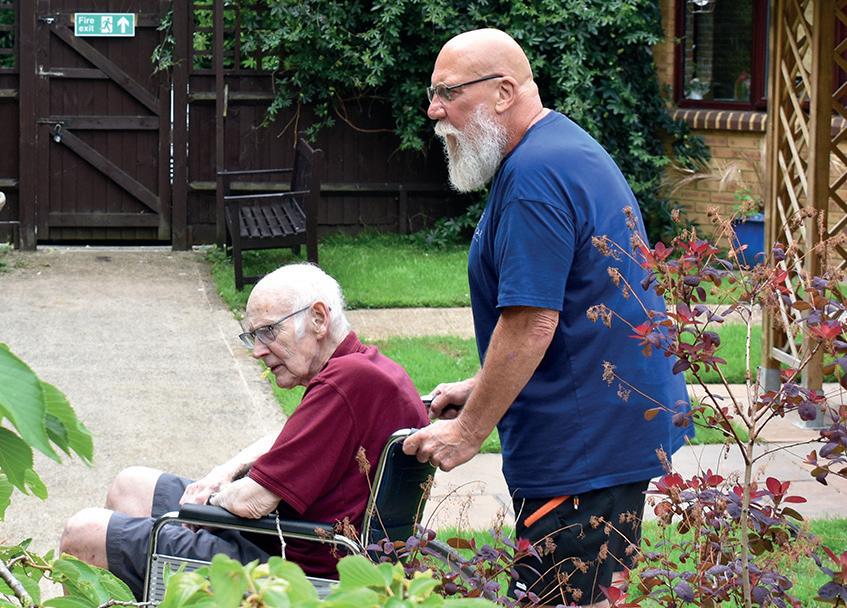
“David is a good listener and takes the time to stop and chat with residents and colleagues,” says Nenita Jopson, care home manager. “If you need something doing, he replies enthusiastically straight away ‘yes, I can do that.’ David is our unsung hero.”

Runner-up 2023:
Runner-up 2023:
Vincent Doherty, facilities manager, The White House Nursing Home
Vincent has been The White House’s facilities manager for more than 30 years. Although he has been diagnosed with cancer and undergone treatment in recent years, Vincent has still shown up to work between treatments ready to support the home and his colleagues. He regularly escorts the activities team on trips so he can help residents on and off the home’s van. Vincent is much-loved by everyone at the home and makes time to talk to residents and their families ensuring they are happy with the facilities provided for their residents. He is an extremely talented carpenter, creating a dedicated visiting pod during Covid to keep residents and families safe, and even making a bar for the residents’ lounge.
Joy Clark, receptionist, The Burlington Care Home, Boutique Care Homes
As a receptionist, Joy’s role goes beyond greeting visitors and answering phone calls. She takes the time to get to know each resident, their interests and their preferences. Joy goes above and beyond to make the residents’ day-to-day experiences more enjoyable. She hosts them in the café for coffee and cake, taking the time to chat and listen to their stories. She has also set up a music club for the residents in the bistro, bringing in her own soundbar and putting together a playlist of old songs. This has been a huge hit.

Runner-up 2023:
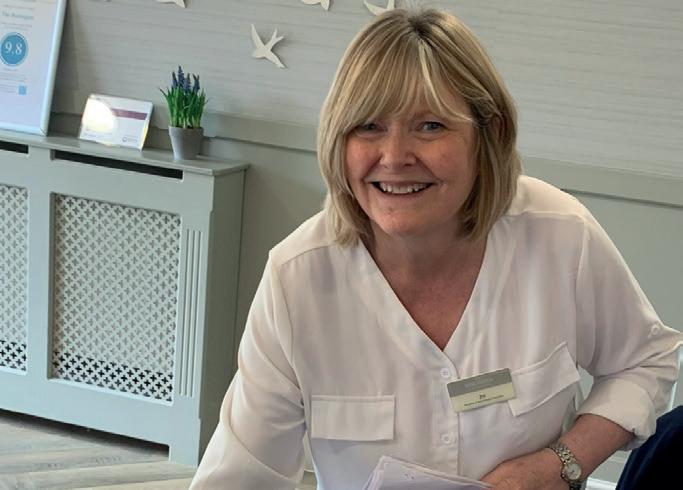
Marcia Hughes, activities co-ordinator, Thorp House Nursing Home, Kingsley Healthcare
Marcia’s drive and enthusiasm is infectious. She uses Facebook and local community pages to showcase the home, with posts shared by local dignitaries such as the mayor, councillors and the local MP. She forges strong relationships to involve the home in the community, and thanks to her there are regular mentions in the local paper. Marcia works hard to ensure no resident feels isolated, and breaks activities down so that everyone can take part even if they can’t leave their room. Through a Wishing Tree she has encouraged residents to find new zest for life. Marcia sends monthly newsletters and activities planners to all the families ensuring they know what’s going on, and to see if they wish to attend anything.
In a world bustling with digital connectivity, loneliness presents a silent yet formidable threat to global health. The World Health Organization's (WHO) declaration of loneliness as a pressing health concern echoes the cries of millions yearning for genuine human connection. It's a challenge Adopt a Grandparent confronts head-on, with a resolute mission to combat these levels of isolation.
Loneliness doesn't discriminate, it transcends age, gender and socioeconomic status. Yet, its impact on older generations stands as a poignant reminder of the pressing need for meaningful relationships. As the chief strategy and transformation officer of Adopt a Grandparent, I stand firm in advocating for a society where companionship and intergenerational bonding are not just niceties but fundamental pillars of wellbeing.
With statistics showing 1.2 million older people in England are chronically lonely and 200,000 older people have not had a conversation with friends or family for an entire month, the alarming facts about loneliness serve as a rallying cry – a call to action for communities to come together. Together, we can champion companionship and combat loneliness through the strength of human connections.
At Adopt a Grandparent, we encourage public sector organisations and local councils to join hands with us in the battle against loneliness — while also collaborating with social care associations, social prescribing organisations and government authorities.
The WHO’s call urging nations to prioritise social connection is exactly why we founded our charity. We've witnessed first-hand the transformative power of cultivating connections across generations. Our success story of almost 100,000 volunteers speaks to the effectiveness of promoting intergenerational relationships, echoing the mandate of the WHO's social
commission dedicated to alleviating loneliness.
Social care organisations stand at the forefront of combating loneliness, wielding a range of effective strategies to prevent isolation among vulnerable populations. One key approach involves the establishment of community engagement programmes, holding regular gatherings, hobby clubs or cultural events that encourage social interaction across different age groups. These initiatives serve as vital avenues for encouraging connections and mitigating the effects of loneliness by providing spaces where individuals can develop meaningful relationships.
Another pivotal role lies in the creation of volunteer networks aimed at offering companionship and support to those at risk of loneliness. Through friendly visits, phone calls or assistance with errands, volunteers become lifelines – forming genuine connections and alleviating the sense of isolation experienced by many.
Embracing technology is equally crucial, especially for individuals facing physical limitations or living in remote areas. Social care organisations can provide access to devices and offer training to ensure a level of connectivity that would allow individuals to stay engaged with friends, family or support networks such as Adopt a Grandparent volunteers.
Intergenerational initiatives are powerful tools in the fight against loneliness. Collaboration with schools or youth organisations creates opportunities for younger generations to interact with older adults through mentoring, shared activities or story sharing. These programmes not only bridge generational gaps but also nurture empathy and companionship across age groups.
Personalised support plans tailored to address individuals’ social needs alongside their physical and mental health are integral, too. Social prescribing, referring individuals to community activities or support groups,

is an effective way to tackle loneliness within personalised care plans. Training caregivers and staff to identify signs of loneliness and implement strategies to address it empathetically is also essential in creating a compassionate and supportive environment.
Moreover, forging collaborations and partnerships with local entities, such as religious institutions, libraries or businesses, creates a network of support and expands outreach efforts. By integrating these multifaceted approaches, social care organisations can actively contribute to preventing loneliness, fostering a more connected and supportive community for those most at risk.
As Adopt a Grandparent gears up for our purpose-driven, annual community campaign –‘Month of Companionship’ – set to launch early this year, we extend an open invitation. Join us, public and private sectors alike, educational institutions, and all facets of the health and social care, as we celebrate companionship. Let's engage in cross-generational bonding activities, developing an appreciation for the joy found in genuine connections.
Beyond simply being a campaign, this is an impassioned plea to embrace companionship and weave together communities worldwide. Let charitable, governmental and social care organisations alike be the catalysts for change, echoing the WHO’s call and shaping a future where loneliness finds no sanctuary amidst the warmth of human connections.

Join our mission to bring people together and end loneliness.
Support a socially driven, charitable organisation committed to reducing feelings of loneliness and isolation, by encouraging intergerational bonding through the pairing of volunteers with the older persons' community.
How can you help?
Download our app Sign up as a volunteer today!

Register your care home!
Our initiative is endorsed by CQC and we would love to have more care homes and older people to pair with our volunteers!

Become a Sponsor!

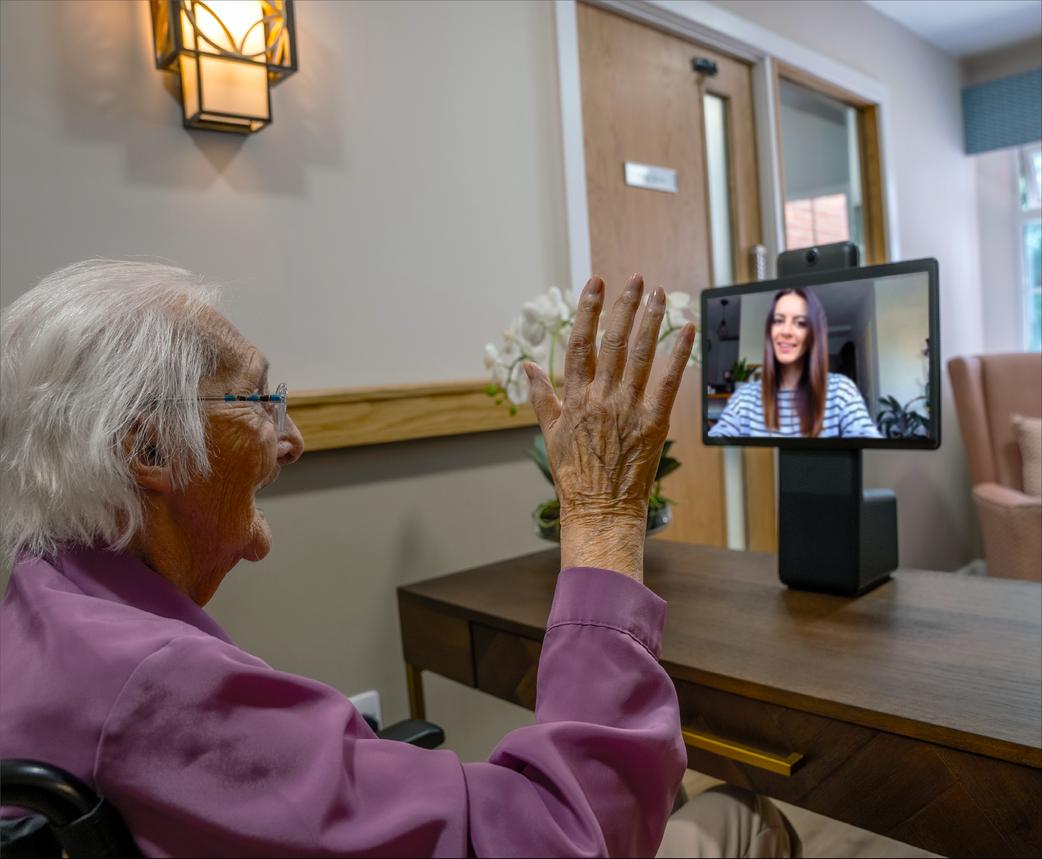
Help us to grow our charity - find out more on our website!
With thanks to our sponsors and partners:





hello@adoptagrandparent.org.uk

“Speaking to Ruby has become the highlight of my week; I always look forward to receiving her calls.”
Iris, ‘Grandparent’




www.adoptagrandparent.org.uk
Founder and chief executive Dr Vishen Ramkisson explains how recent market entrant AgeCare UK is transforming its delivery of care through digitalisation
Part of Canadian care home operator AgeCare, AgeCare UK was founded by practising GP and care home owner Dr Vishen Ramkisson in 2022.
Over the past 12 months, the UK business has undergone a major digital transformation programme at its nine, mostly paper-based care homes that were acquired in the South of England in February and July last year.
“We have been going through an ambitious digital transformation programme,” Ramkisson says. “With rising costs and financial pressures, we have to deliver efficiencies as quickly as possible. We have done things that in normal times would probably take care home operators three or five years to do.”
CoolCare has been adopted as the company’s core management software provider, and it also in the process of rolling out Person Centred Software’s digital care planning system. Compliance is managed through QCS and AgeCare has also adopted digital accounting, payroll and staff rostering systems.
“We don’t do anything with rotas on paper,” Ramkisson says. “We have digital clock-in also. It helps us understand where the gaps in shifts are so we can plan. If your lead systems and your rotas are all digitised you can straight away see who is available and who to call. All of our agency and bank staff are on our systems. They are clocked in and pushed into shifts electronically. Our agency use has come
“I’d like to think AgeCare will be at the forefront of transforming the way care is being delivered in the UK."
down dramatically.”
Additionally, Radar Healthcare’s incident management system is being rolled out with all systems stored securely on the cloud through Microsoft 365. AgeCare has also developed and is deploying its own in-house HR, maintenance, invoice approval and leave planning systems.
Integration with pharmacies through a digital medicine system has been rolled out at two care homes, and rollout across the remainder of services will be completed by June this year.
All staff from deputy manager upwards are formally appraised digitally and AgeCare is also developing a digital skills training programme for all colleagues.
“I’d like to think AgeCare will be at the forefront of transforming the way care is being delivered in the UK. That is our mission statement,” Ramkisson says. “We are here to transform the delivery of care and make it more sustainable and environmentally friendly but also to give time back to residents.”
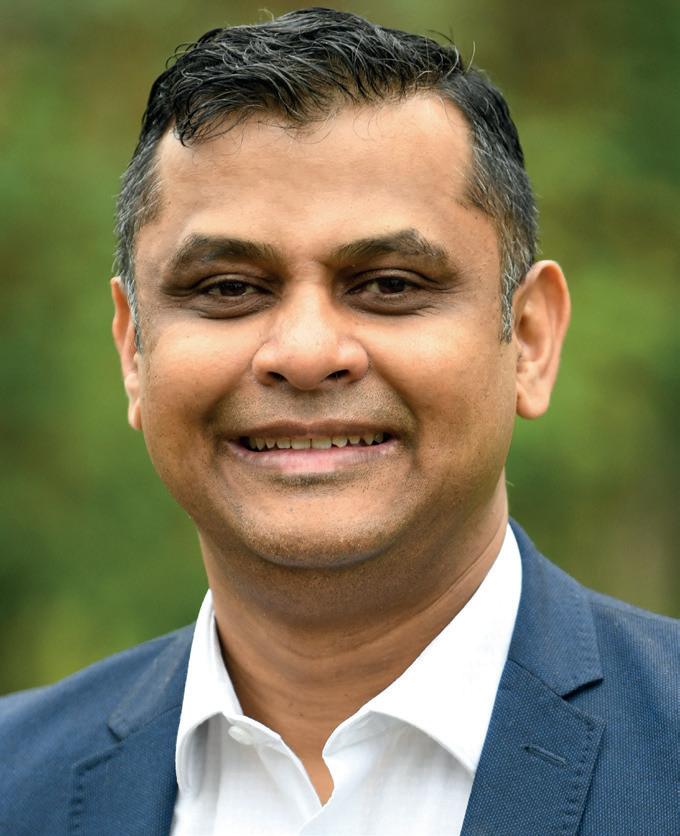
Financial controller, Nileshi Parbat, says: “These different types of software give us a great overview of the business at head office level. We can have them all under one umbrella and I can log in and see occupancy and which staff have clocked in or who has had training. That allows us to bring in efficiencies without interrupting the care that is
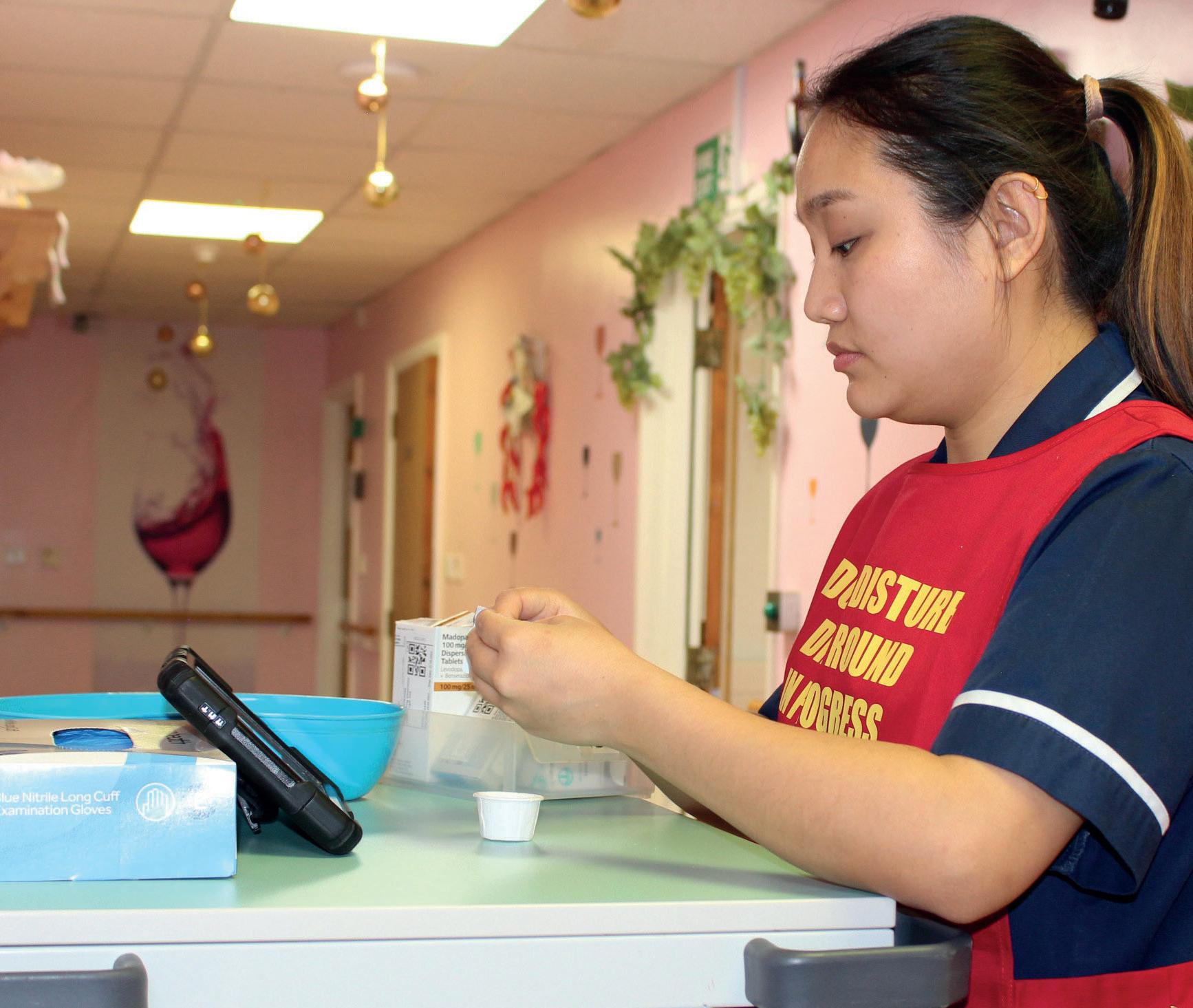
given to the residents.”
Such rapid digitalisation does not come without challenges, however. Parbat noted it has been an “uphill struggle” at times to change the mindset of teams used to older systems and legacy processes.
Director of care, Jo Mason, who admits to have been a “real pen and paper person” and a “bit nervous” about digitalisation, says she’s now a convert.
“To be able to go onto my computer and see what’s going on in a home is fascinating,” she says “It’s current information. I haven’t got to stride around every home to see if it’s okay. I can see what is being flagged up and can call them to investigate.”
Ramkisson says technology had enabled real-time communication across the business.
“I have Teams briefing meetings where I can speak to all our line managers in real-time at the drop of a hat and ask them to share things with their teams,” he says. “It allows us to share great ideas across the business a lot quicker.”
Parbat agrees noting Teams technology can bring together activities team members who normally work separately to share best practice and ideas. Digital tech is also employed effectively to share good news and outstanding practice happening in homes every day through social media.
AgeCare has employed a dedicated in-house network and IT systems specialist, as well as a dedicated person to look after digital social care marketing and a specialist who regularly updates the company’s website.
This year AgeCare will focus on cybersecurity and is also building an in-house AI chatbot to provide service information on its website which should be ready by the end of the year.
Finance director Ajay Mavinkurve notes: “The early signs have been promising, the use of paper, printer ink and postage has reduced dramatically,
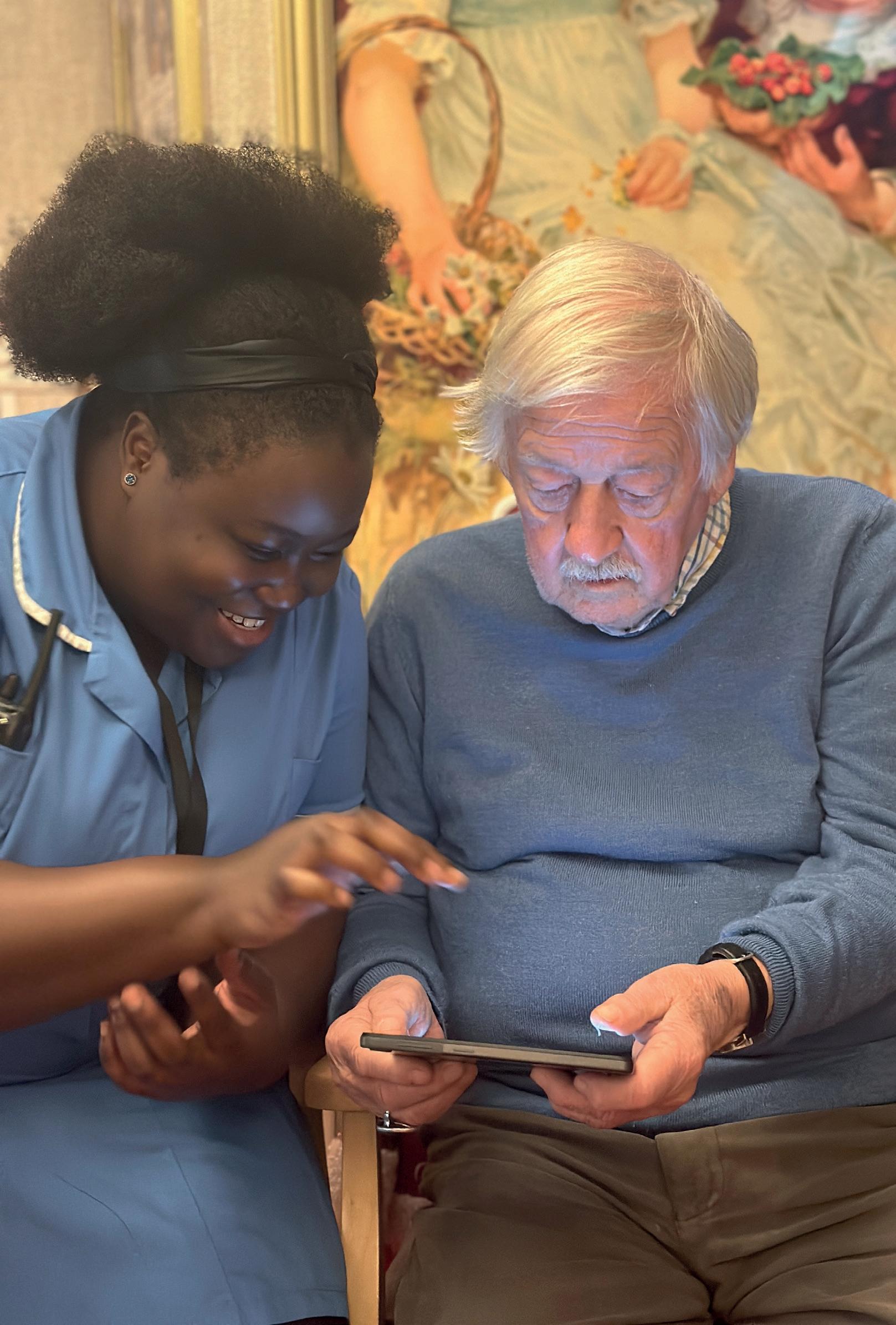
key performance information is more accurate and timelier, and there’s the additional positive environmental impact which contributes towards ESG reporting.”
Describing the business as a “data company that delivers care services”, Ramkisson adds: “We will very shortly have a lot of data that we are collecting in a very structured way that we think will help us plan for the future. The way the CQC is changing we want to make sure we are ready. If they want data, we’ve got it and it’s structured and ready to go. We don’t want to have them question out of date or incorrect
information.”
A digital evangelical, Ramkisson previously led NHS Digital’s national IT programmes and built the tech and data for the Covid-19 vaccines roll-out.
“You have to have the passion to move forward and look at how you can do everything better,” he says.
Ramkisson concludes by stressing technology adoption was “all about the quality of care we deliver”.
With two of its care homes rated Outstanding and the rest rated Good, AgeCare is well-placed to go from strength to strength on its digital journey.
Geraint Thomas, founder of tech consultant Guided Innovation, explores five distinct types of software, highlighting their characteristics, advantages and disadvantages
Digital software is playing an increasingly pivotal role in the social care sector, catering to specific needs and functionalities. I’ve highlighted a few solutions commenting on each software type. However, this doesn’t mean they are recommended and there are many more solutions out there.
These are the applications such as Access, Nourish Care and Person Centred Software that dominate their respective industries and are widely adopted. In our sector these are companies that found themselves in the right place at the right time, booming as adoption of care planning solutions has taken off. They’ve managed to get a big slice of the cake, with good market adoption.
Pros
- Comprehensive features: marketleading software often boasts an extensive range of features and functionalities.
- Safe pair of hands: being larger companies, they are more likely to be around for years to come and continue investing in their products.
- Integration capabilities: These solutions typically offer seamless integration with other popular tools.
Cons
- Cost: market-leaders often come with a higher price tag, making them less
accessible for smaller businesses.
- Support: implementation and support services are commonly a ‘second thought’ over the development of the software and sales.
- Customisation limitations: some market-leading software may lack flexibility, limiting customisation options for unique business requirements.
Domiciliary care software applications such as Birdie and everyLIFE Technologies’ PASS system, are designed specifically for the management and administration of home carebased services. The needs of a care planning solution in domiciliary care is considerably different to the care home market. These solutions are tailored to this area of social care and allow more mobile and responsive care planning.
Pros
- Streamlined operations: domiciliary care software commonly integrates digital rostering, helping optimise scheduling, billing processes and care planning.
- Mobility: solutions are built with a focus on users being out and about, often using hand-held devices
- Improved communication: enhances communication between carers, those they are supporting, and the circle of support.


Cons
- Steep learning curve: domiciliary staff often struggle with new tech more than their colleagues in care homes.
- Initial investment: upfront costs for software and training can be a barrier for smaller domiciliary care agencies.
3. Multifunctional
Multifunctional software such as that provided by Carebeans, Onetouch and Advanced, is characterised by its ability to perform various tasks within a single application. These don’t focus on one solution such as care planning, instead they deliver a holistic product that can digitalalise many of the processes in a care company, from invoicing to property management, all in one system.
Pros
- Consolidated tools: users can access multiple features from a single platform, reducing the need for separate software.
- Cost-effectiveness: combining functionalities in one software solution can result in cost savings.
- Unified user experience: users benefit from a cohesive and consistent interface for various tasks.
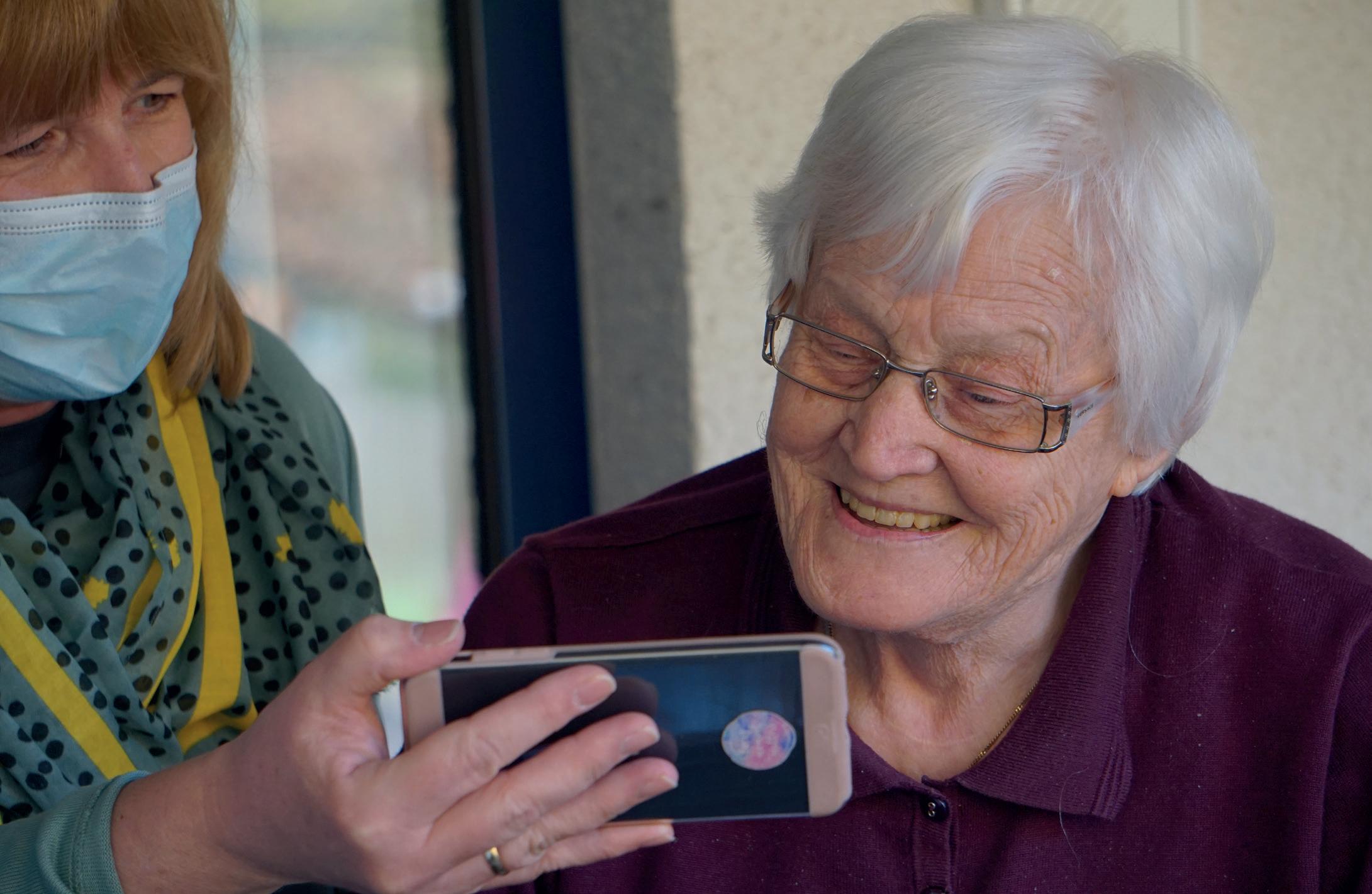
Cons
- Complexity: integrating multiple functions may lead to a steeper learning curve for users.
- Jack-of-all-trades, master of none: splitting development spend across so many functions results in a lot of options, but can display a lack of depth in any particular function.
Plug and play software such as Log My Care, is designed for easy installation and immediate use without extensive configuration or training. This has not been seen before in the digital care planning sector. We’re seeing newer companies moving the development focus away from features, instead focusing on ease of use and an eyecatching interface: buy it, turn it on and start using it.
Pros
- Quick setup: users can start using the software with minimal setup requirements.
- Accessibility: suitable for users with limited technical expertise.
- Time-saving: reduces the time spent on installation and configuration.
Cons
- Limited customisation: plug and play software may lack advanced customisation options.
- Scalability challenges: not always suitable for complex or growing business needs.
In the landscape of software solutions, there are often hidden gems that, despite not being market-leaders, offer outstanding features and benefits. Without the vast sales and marketing spend of the market-leaders, these companies such as Kareinn, Sekoia, Care Vision, and CareVITALS, can often be overlooked by those procuring tech. Their features are rarely worse than larger products and it’s common for these solutions to try and do things differently, innovating to stand out.
Pros
- Tailored solutions: overlooked solutions are known for flexibility and high customisation, adapting to unique business requirements.
- Engaged user communities: despite smaller user bases, overlooked solutions foster strong user
communities with active forums and shared knowledge.
- Niche expertise: focused on specific niches, these solutions provide deep expertise and tailored features.
Cons
- Niche expertise (again): as a potential con, a niche focus means these systems may not be appropriate for all care organisations.
- Trust issues: users may hesitate to adopt solutions without widespread acclaim, potentially missing out on their benefits.
- Development resources: smaller teams may have limited resources, potentially resulting in longer development cycles for updates and new features.
Understanding the pros and cons of different types of software is crucial for businesses and organisations when selecting the most suitable solution for their specific requirements. Each type offers unique benefits and challenges, and careful consideration is essential to make informed decisions that align with your organisational goals.
Music therapy charity The Spitz Charitable Trust celebrates its 10th anniversary this year. General manager Thom Rowlands shares how the charity uses the joy of live music to transform peoples’ lives
The Spitz, which was born at an iconic music venue of the same name in East London, became a charity on 12 December 2013.
Over the last 10 years their musicians, including some of those who performed at the original venue, have been providing intimate, participatory sessions for those who need them most, from babies in intensive care to people who’ve suffered brain injuries and those receiving end-of-life care.
The Spitz has been based at Bridgeside Lodge Care Home in Islington since 2018, where it has brought countless moments of joy and connection to residents. The charity also serves other care homes, as well as day centres and hospitals.
“There’s rarely that much of a plan,” general manager Thom Rowlands, told us. “The musicians will go and see who is around and spend time with them. It’s very organic.
“We work with small groups of five or six residents or can go to residents’ rooms if they are bed bound. It could be just a few songs or we can also have a bit of a chat if they need to have a bit of a whine because they are in a bad mood that day. That’s what we are there for.”
Bridgeside carer Asma Sharif said: “I know the residents like the music and are always asking when the next session is happening. Some of them love to sing. It makes them really happy. We see their mood change when they listen to the music. They calm down if they are in a bad mood.”
As well as providing joy to residents, Rowlands said the interactive sessions
“We work with small groups of five or six residents or can go to residents’ rooms if they are bed bound."

also benefit families.
“Family members find seeing their nan dance and having a great time brings them a lot of comfort,” Rowlands said. “It can help with some of the guilt families can feel when putting their mum in a care home.
Benefits from the sessions are also felt by carers.
“If someone has had a music session in the morning they are in a better mood and more receptive to care,” Rowlands explained. “There’s not that friction when you are trying to help them wash or eat. They are more cooperative.
“Also, if residents are more receptive to eating and drinking, they tend to have fewer falls as their balance is better when they are hydrated.”
The Spitz has received NHS funding for the past two years in recognition of the preventative care and therapeutic benefits it provides.
“That felt like a real validation of the work we are doing,” Rowlands noted.
Looking back on the major milestones and highlights of its first decade, Rowlands picked out a recent BBC Breakfast feature on the charity. The Spitz was also honoured with an award from the Mayor of London in 2019.
The charity will continue to mark its 10th anniversary over the coming months with an album of original songs by residents planned, as well as a concert to celebrate its work featuring many of its past and present musicians.
“We are not limiting it to one day, we are making it a six-month celebration,” Rowlands said.
To further mark turning 10, The Spitz is launching a new website and PR campaign to raise awareness of its pioneering work and running a new crowdfunding campaign this year.
To find out more visit spitz.org.uk
As always, carers have been demonstrating their creativity through fun and innovative events for their residents

Athena Care Homes’ Avocet Court scooped second place in the annual Light Up Ipswich competition. The home was transformed into a winter wonderland with an array of amazing lights, including an igloo, walk-through tunnel and candy canes. Avocet Court came second in the Best House Decorations category of the awards, organised by local MP Tom Hunt.

On the cards
Live-in care provider Promedica partnered with Silcoates School in Wakefield, West Yorkshire for the Connecting Generations project which aims to bring pupils together with people with care needs. Children aged between four and 11 wrote more than 150 Christmas cards to people receiving live-in and home care, including festive drawings and messages.

In the navy
Manchester City fan John Cunningham from Ideal Homes’ De Brook Lodge in
Urmston, Manchester, celebrated his 100th birthday with a visit from former City player Peter Barnes. The Merchant Navy veteran also received a visit from a member of Trafford Veterans who presented him with a cake, a walking stick made by Military Veterans Walking Sticks and a Centenary Merchant Navy Magazine.

HC-One’s Dove Court care home in Burnley opened a sensory garden in memory of previous resident Muriel Clucas. Muriel, whose room overlooked the garden, loved the outdoors, gardening and wildlife. Funds from Muriel’s estate were donated to Dove Court to enhance the home’s garden with furniture, plant pots and rose bushes.
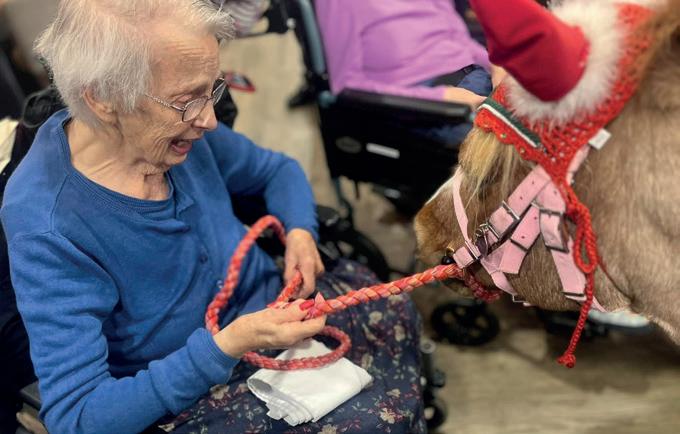
TLC Care Homes' Cambridge Manor hosted a Winter Fayre with activities including mini ponies, a brass band, local craft stall holders, festive food, and a special visit from the local mayor, who chatted with residents about Christmas traditions. Residents and visitors were able to explore and purchase crafts from local stall holders.
Visit from Santa Littleton Lodge resident Ben Tillson

spread some Christmas joy to Sandwell General Hospital Childrens Unit when he visited dressed as Santa, delivering special gifts from staff and residents. Joined by Santa’s assistant Soni Atwal, the front of house manager at Littleton Lodge, he met with each child in the hospital.
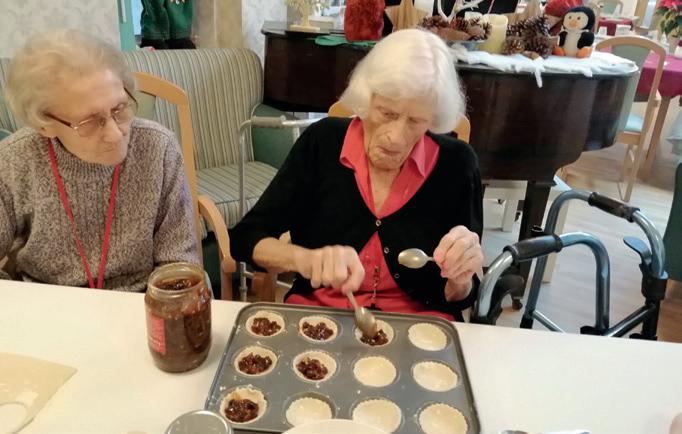
Residents at Friends of the Elderly’s RNNH care home in Bournemouth got busy baking three kinds of mince pie: a festive mince pie, a ruby port mince pie and a rum mince pie. After a taste test the rum mince pie was declared the winner. Caroline Gulen, registered manager, said baking activities evoke memories, stimulate senses, promote calm and keep the brain active.

Colten Care’s Woodpeckers care home in the New Forest held a ‘meet the reindeer’ afternoon for local children,
>
residents and others. As well as mingling with Prancer and Jingles, visitors played games, bought gifts and took part in a raffle. The event raised more than £1,200 for young carers charity Honeypot.
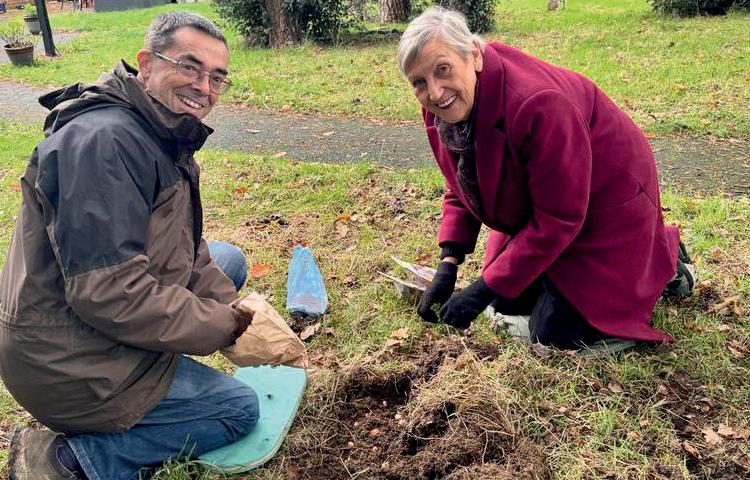
Deerswood Lodge care home in Crawley hosted a spring bulb planting event as part of its rewilding project. The mayor of Crawley, family and friends were invited to join residents and staff to plant more than 400 bulbs. When complete the outside space will include a wildflower meadow, prairie border, vegetable patch, sensory trail and a mini orchard.

Daredevil residents from three Glasgow-based Renaissance Care homes rode fairground classics like waltzers, dodgems and Flying Dumbos at the opening of the 104th Irn-Bru Carnival. Residents tucked into burgers, salt and chilli chips and churros at the carnival, which first took place in 1919 and has since become one of the city’s biggest annual festive events.

Wilson the white wallaby paid a visit to residents at Barchester Healthcare’s Paternoster House Care Centre in Waltham Abbey. Performing Pets, which brought along the special visitor, explained the significance of white wallabies at Christmas. Residents learned that in Australia legend has it that Santa swapped his six reindeer for six white wallabies. Wilson enjoyed exploring, but was equally happy cuddling up to residents and staff.

Residents at Lanercost House in Carlisle got creative and put their baking skills to the test for Barchester Healthcare’s Christmas cake competition. Residents decided a Christmas wreath would look the best, so the perfect recipe was located and the masterpiece was created. Everyone got involved making different elements of the cake.
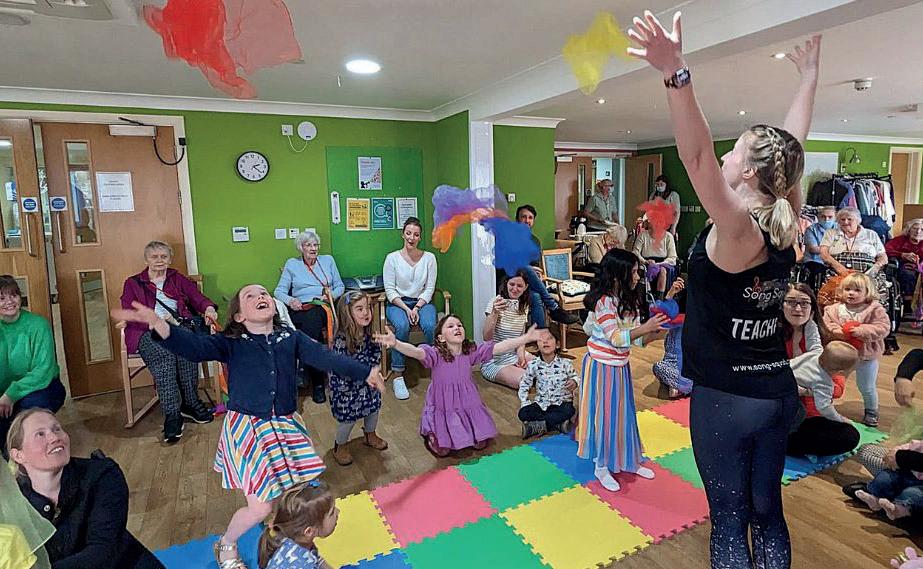
Bedford-based performing arts organisation Song Squad has been running intergenerational music group Share a Smile Singalong in three Bedfordshire care homes. The music and movement sessions, which include fun props, parachute play and musical instruments, take place in St Andrews homes Danecroft House and Elcombe House, and Charter House, run by Bedford Citizens Housing Association. Children and residents sing songs and nursery rhymes together.
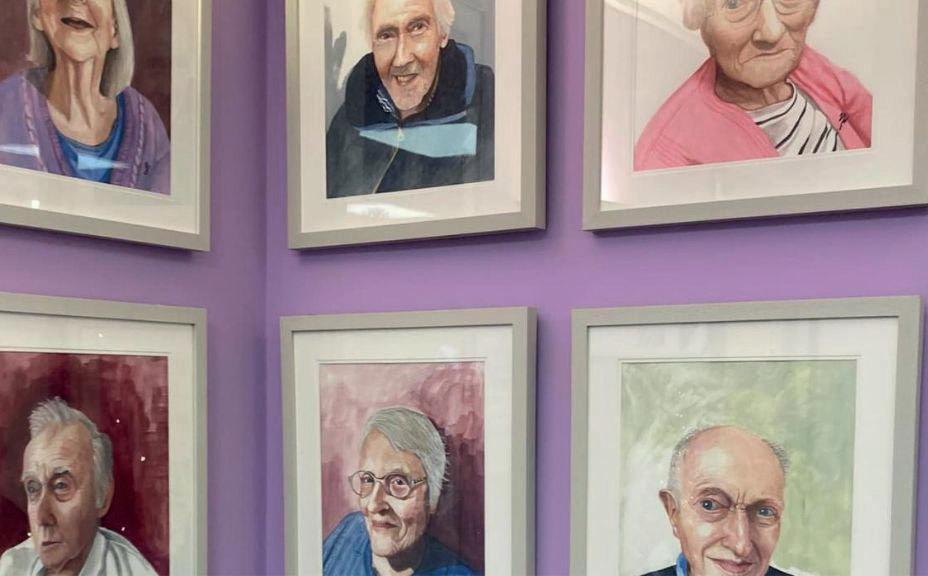
A local artist spent more than six weeks drawing and painting portraits of residents at Brunelcare’s Deerhurst Care Home in Bristol. The artist completed 45 paintings and sketches, which now hang in the home’s new art gallery.
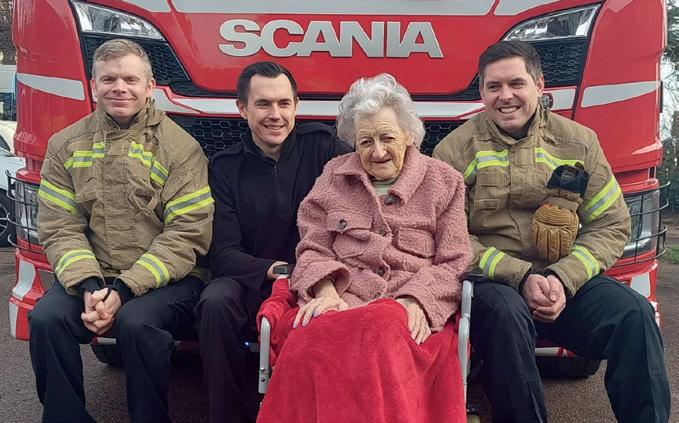
Gwen Fenlon, 93, a resident of HCOne’s Pytchley Court in Northampton, received a Boxing Day visit from the Moulton Fire Service firefighters after the home’s wellbeing team found out about her interest in the fire service. Gwen, who has a firefighters calendar hanging on her wall, was taken around the fire truck to see how it worked.

Sandstone Care Group's Longridge
Hall Care Home opened its own inhouse pub for residents. The Lodgers Arms, which boasts its own bar, lounge furniture, pub games and a range of alcoholic and soft drinks, was the idea of staff and residents. The home’s activities co-ordinators are planning weekly gentlemen’s afternoons to be held in the pub throughout the year.
The New Year is a great time to reinvigorate a digital transformation strategy in any business and care homes are no exception. Bringing a renewed focus helps businesses embrace new and innovative solutions to elevate the standards of care provision and streamline operational efficiency. Among the essential tools in this transformational journey, care home administration software emerges as a cornerstone for catalysing progress and enhancing overall care quality.
The importance of digital transformation in social care
The landscape of social care has evolved significantly in recent times, prompting an urgent need for digital evolution. Like many other industries, the Covid-19 pandemic magnified the existing challenges within care homes, accentuating the necessity for swift, adaptable and resilient operational frameworks. Digital transformation stands as the linchpin in this process, offering a pathway to overcome hurdles, improve care delivery, and fortify the sector's sustainability.
Care home administration software plays a pivotal role in reinvigorating digital transformation efforts. The technology can offer a suite of features designed explicitly for the unique demands of care facilities. From managing resident record and occupancy and enquiries to facilitating efficient communication among staff members, the software streamlines administrative tasks, ensuring accuracy, transparency, and compliance with regulatory standards.
Moreover, these platforms often integrate robust reporting functionalities, empowering care home managers with real-time insights into

operations. This data-driven approach fosters informed decision-making, aids in resource allocation, and facilitates proactive interventions to enhance resident care.
The integration of administration software not only automates mundane tasks but also allows care teams to dedicate more time to direct resident care. By minimising paperwork and administrative burdens, staff members can redirect their focus towards delivering personalised and compassionate care, enriching the overall resident experience.
With growing connectivity between dedicated care technologies, including partnerships and integrations between some of the market leaders, the benefits are becoming even more wide reaching. Linking the functionality of various platforms gives care home managers and administrators the ability to both do more with the data and spend less time doing it.
Despite the numerous benefits, the adoption of digital solutions in care homes encounters challenges such as initial implementation costs, staff training requirements, and concerns regarding data security and privacy. However, these obstacles are
surmountable with strategic planning, adequate support, and collaborative efforts from stakeholders within the social care ecosystem. Equally, working with technology providers who demonstrate their commitment to data security through the right certifications such as ISO/IEC 27001 (2022) can give care businesses greater reassurance. Ultimately, the New Year offers an ideal chance to reinvigorate digital transformation strategies in UK care homes. Care home administration software stands to play a pivotal role in this transformative journey, empowering facilities to elevate care standards, optimise operations, and ultimately enhance the wellbeing of residents. As we step into the new year, a concerted focus on leveraging technology will undoubtedly pave the way for a more robust, efficient, and person-centred social care landscape in 2024.
Iain Corrigan is commercial director of CoolCare. Centred on admin made easy, its services are aimed at making operating care homes easier, more efficient and more profitable.
Following three decades of care home administration software development, CoolCare knows what good looks like –and it seeks to help care homes love their admin by making it simple. Its intuitive design drives higher staff confidence and increases the impact of digital adoption, while CoolCare’s user-friendliness is legendary, making it the software of choice for some of the UK’s leading care home operators.
Hiya all. Last year didn’t end that well for me sadly as I was admitted to hospital with pancreatitis, a very nasty and painful illness and because of existing health conditions I also went into heart, kidney and liver failure; at one time I was even bright yellow. It was a very close run thing but I’m still here to tell the tale thanks to all concerned saving my life while I was there. But?
The awareness of dementia among the staff, and I mean all staff from consultants to nurses, was woefully lacking which I will say on record now is “not their fault” (I am a huge NHS fan) but the fault of those in charge. As you know, I have the Lewy bodies type dementia which can come and go for short or long periods of time, mostly late afternoon and evenings is my worst time, but I am sure some of the staff had memory problems as bad as me, as I lost count of the times I said to them: “What part of ‘I have dementia’ are you having trouble understanding, please?”
Every day they bombarded me with question after question and unless my wife was there it was ever so frustrating to say the least. Now let’s get this right, dementia in now the UK’s biggest killer healthwise and yet? Well, you know the rest I am sure, and yet those who are supposed to be aware of it, those that come across it on a regular basis know so little about it or differing types of it, yes, there is something very wrong there.
On a happier note, last year the Purple

Angel Dementia Campaign UK charity which I founded myself, sent out more than 1,200 free (yes that’s free, so this is not a sales pitch in any way shape or form) MP3s to those with dementia in the UK with music of their very own choice uploaded onto them as part of our free MP3s for all with dementia in the UK campaign.
We are now in our fifth year doing this and over the years have sent out in excess of 10,000 free MP3s around the UK, including to care homes, hospitals, nursing homes or those living at home with loved ones with dementia, including headphones, postage and packaging and help afterwards if needed.
The feedback has been incredible and we know we are helping thousands every

day across the country. We keep it free thanks to our incredible fundraising team so we take all the worry and cost out of it, and in today’s climate as they say, every little helps.
If you haven’t heard of our campaign? Why not? But no matter, you have now. Here’s the link: purpleangel-global.com/ mp3-players/ and please feel free to contact me directly on norrms@gmail. com that’s two rr`s in norrms or I really won’t get it. Here is a small example of feedback we have had:
“This gentleman’s MP3 player was full of songs he chose himself, a lot were happy songs he could sing along to. This man as part of his dementia has tendencies to shout inappropriate comments out in the lounge, but when using his MP3 player the inappropriate comments seem to cease and he will sing along to his chosen music. He also enjoys to share his music with other family members in our home.”
“This lady was over the moon when she received her very own MP3 player. She could not believe it contained a little bit of every genre she liked. James Last was a firm favourite and she could now listen to him as her leisure. When she plays her music her foot begins to tap and then her arms begin to sway, the joy this brings is beautiful to watch.”
Till next time…
Marina Holder, housekeeper at Stow Healthcare Group’s Stowlangtoft Hall Nursing Home in Bury St Edmunds and winner of the National Care Awards’ care housekeeper of the year, shares how she goes the extra mile.
Tell us a bit about your background – how did you get into care housekeeping?
My mother had previously been at Stowlangtoft Hall, and we were so looked after as a family, this really stuck with me. When the school I was working in closed I took a chance, knocked on the door of Stowlangtoft Hall, and who should answer but owners Cath and Ruth. I said: “I have come for a job” and laughed and they both said come in, and I had my interview there and then. Nine years later, I have never looked back.
How do you go about meeting the needs of residents?
I get to have really meaningful conversations with our residents. You build up a relationship with them over time, building trust, and often you learn things about people that you never knew. For example, I was chatting to one of our residents about the coronation and found out that the Gold State Coach used by their majesties on Coronation Day was stored locally to where she used to live during World War II. The landowner invited her over to see the coach and she even got to sit in it.
What does a typical day look like?
Every day there is something different. I start off by preparing trolleys for the day ahead, whether breakfast trolleys on our landings or cleaning trolleys for our round. It is important to make sure everything is well stocked and available for my team. I then look at my allocated area for the day and begin my cleaning duties. I get to meet and chat with residents as I clean in and out of their rooms.
What is the most challenging part of your job?
Time. You can plan your day, but something happens overnight and all of a sudden a room needs to be prepared
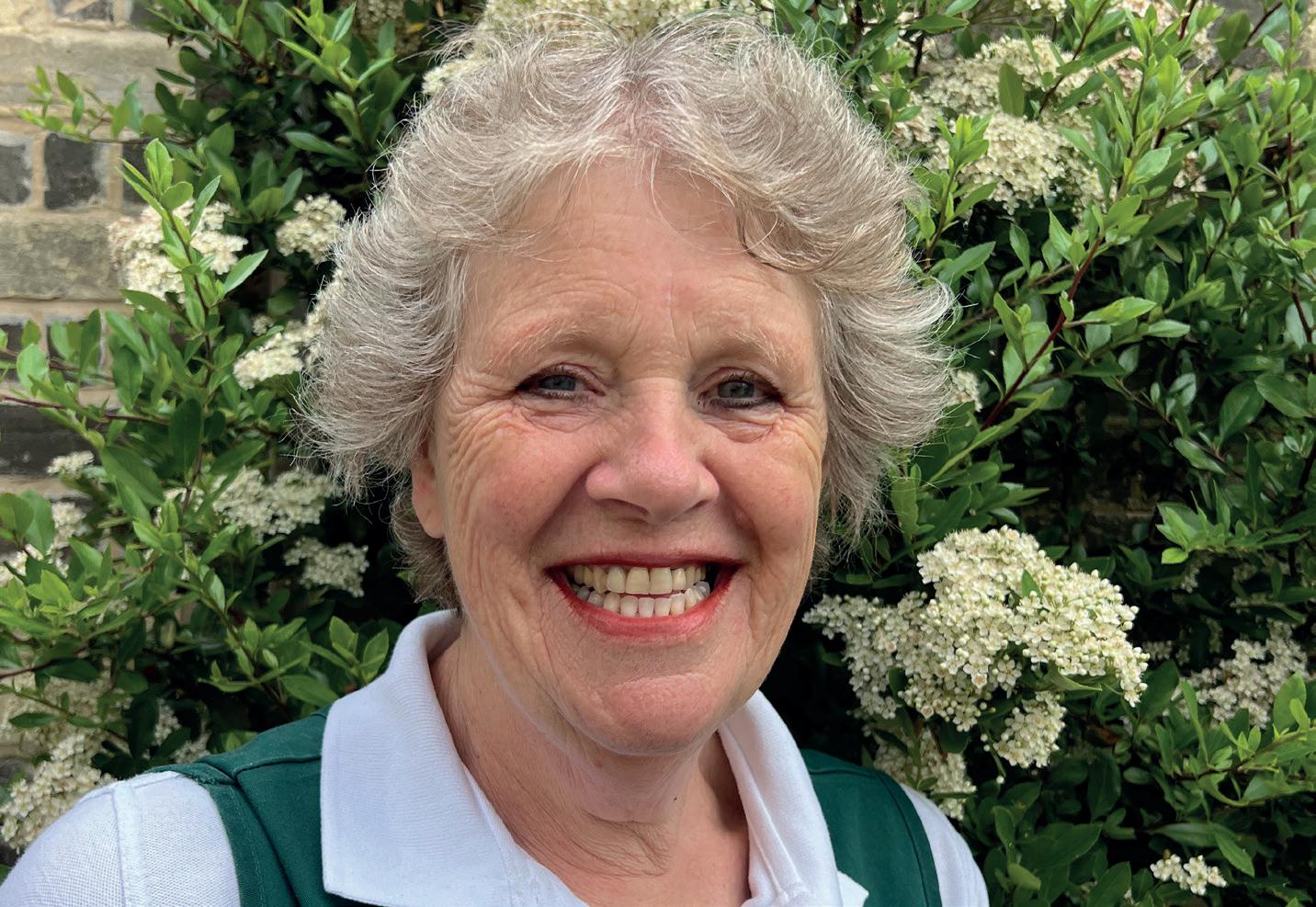
urgently. We are all a team in the housekeeping department, and we jump in and support one another when things change in an instant. We know each other’s strengths, and all pull together to get done whatever is needed for our residents.
Is there anything that would surprise people about your job?
I think it is how involved we are with our residents. I am not just a ‘cleaner’, I am very much a member of the team that delivers care for our residents. I have completed my moving and handling practical training, so I am there to support colleagues if I need to help take someone to the toilet or get someone out of bed. They do not need to wait for another carer.
Has anything changed since you started your role?
The home has introduced new electronic care plans since I joined and as cleaners we are part of that process. We have log-ins for the system and can input key things from our conversations that may impact someone’s care.
What is special about the care home you work for?
We are one big family and we all support one another on good days and bad. This is not just as housekeepers but as a whole team. Sometimes a nurse will come to me and say I am having a tough day today and we talk about it and hug it out, another day it might be my turn, but I know someone will always be there for me. This goes all the way up to management and our directors who are often in the home.
What skills and talents do you need to be a great housekeeper?
You don’t need to come with any skills – this is what we have training for. It is about people’s attitude. You just need to be a team player, a good listener and be willing to do your best. A good sense of humour and a smile is also a bonus.
What one piece of advice would you give to other housekeepers?
There will be challenges but these are far outweighed by the benefits of caring for people. I just love my job and I love coming to work.
Dorset
Registration:
Purchaser:
Seller:
Price:
Business
Contact
Dyfed
Registration:
Purchaser:
Contact
Kent
South
Registration:
Contact
South
Name
Location:
Registration:
Purchaser:
Seller:
Price:
Business
Contact person:
Smallwood Blandford Forum
Closed vacant care home
Nine Points Property Voyage Care
Undisclosed
Christie & Co
Charles Phillips – 07764 241 346
Towy Castle Residential Home
Carmarthen
Residential home
Undisclosed
Undisclosed
Undisclosed
Christie
Oliver McCarthy – 07702 809 198
Abbeyfield
Walmer
Undisclosed
Undisclosed
Leasehold
Christie & Co
John Harrison – 07764 241 296
Emyvale House Rotherham 16 beds
IBC Healthcare
Oldale
£495,000
Christie & Co
Jonathan Wickens – 07764 241328
Lockermarsh Residential Home
Doncaster
Closed at point of sale – previously registered for 24
Parallel Parents
Oldale
£495,000
Christie & Co
Jonathan Wickens – 07764 241328





Name
Location:
Registration:
Purchaser:
Seller:
Price:
Business transfer agent:
Contact person:
West Sussex
Name of
Location:
Registration:
Purchaser:
Seller:
Price:
Business transfer agent:
Contact person:
West Yorkshire
Name
Registration:
Purchaser:
Seller:
Price:
Business
Contact person:
Name
Registration:
Purchaser:
Seller:
Price:
Business transfer agent:
Contact person:
Manor Barn Nursing Home
Fishbourne
Nursing home
Undisclosed
Undisclosed
Undisclosed
Christie & Co
Charles Phillips – 07764 241 346
The Anchorage Rest Home
Pulborough
Residential home
Undisclosed
Undisclosed
Undisclosed
Christie & Co
Charles Phillips – 07764 241 346
Newsome Nursing Home
Huddersfield
Closed at point of sale – previously registered for 46
Mr Nazir
Liquidator of Huddersfield Nursing Homes
£895,000
Christie & Co
Jonathan Wickens – 07764 241328
Capel Grange Residential Home
Kent 38
Undisclosed
Undisclosed
Undisclosed
NGA Care
Nick Greaves, 07943 107 887






Christie & Co is delighted to announce the launch of our annual report, Business Outlook 2024.


Chiltern View (Closed Care Home)
Bedfordshire
Freehold, £1,500,000
• 33 bedrooms (28 en suite)
• Detached building GIA 874 sqm
2470407
T: 07736 615 870

Care Home, Central Scotland
Freehold offers invited
• Registered for 30, 27 bedrooms (All ensuite WC)
• CI ratings “Very Good”
May 2023
5274722
T: 07701 315 068
We have a large pool of buyers ready to invest in the UK social care sector.

Freehold offers invited
• Registered for 56
• 56 bedrooms with ensuite WC
6870540
T: 07764 241 280


Freehold £1,450,000
• Care home with nursing, registered for 25
• Categories of old age and dementia
3878311
T: 07764 241 346
St Catharine’s (Closed Care Home), Hertfordshire
Freehold £2,000,000
• 21 ensuite bedrooms over three floors
• May suit specialist care home operators
2470400
T: 07736 615 870

Care Home, Berkshire
Freehold £1,600,000
• Registered for 20
• 19 bedrooms, 17 with en suite
3878310
T: 07764 241 346
Care Home, Pembrokeshire
Freehold £1,000,000
• Residential EMI care home for 14 clients
• Newly refurbished owner/staff accommodation
3470743
T: 07702 809 198

If you’re thinking of selling your care business, speak to the experts:

Confidential Property

Nursing Home, Kent
Freehold £1,100,000
• 21 bedrooms, sea views and generous grounds
• Average fee over £1,000 per week
8877765
T: 07764 241 296
christie.com


Our Caring Times Owners Club events are a great mixture of informative content, business opportunities, fine dining and networking/socialising.
The day comprises a mixture of presentations, panel discussions and eight one-to-one supplier/owner meetings, making the most of your time whilst in the beautiful hotel setting.
2024 events
Celtic Manor 29 February 2024
Oulton Hall 02 May 2024
The Belfry 07 November 2024

